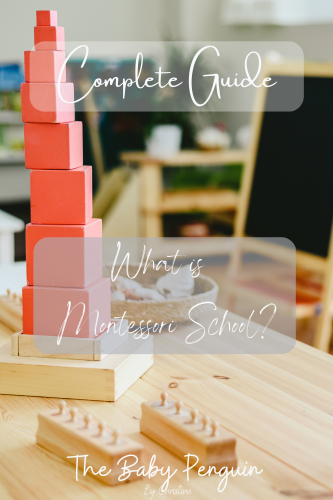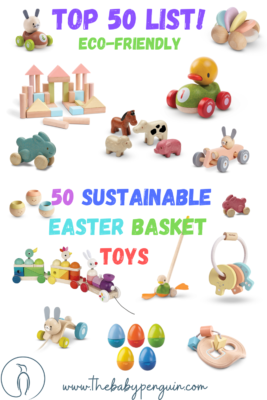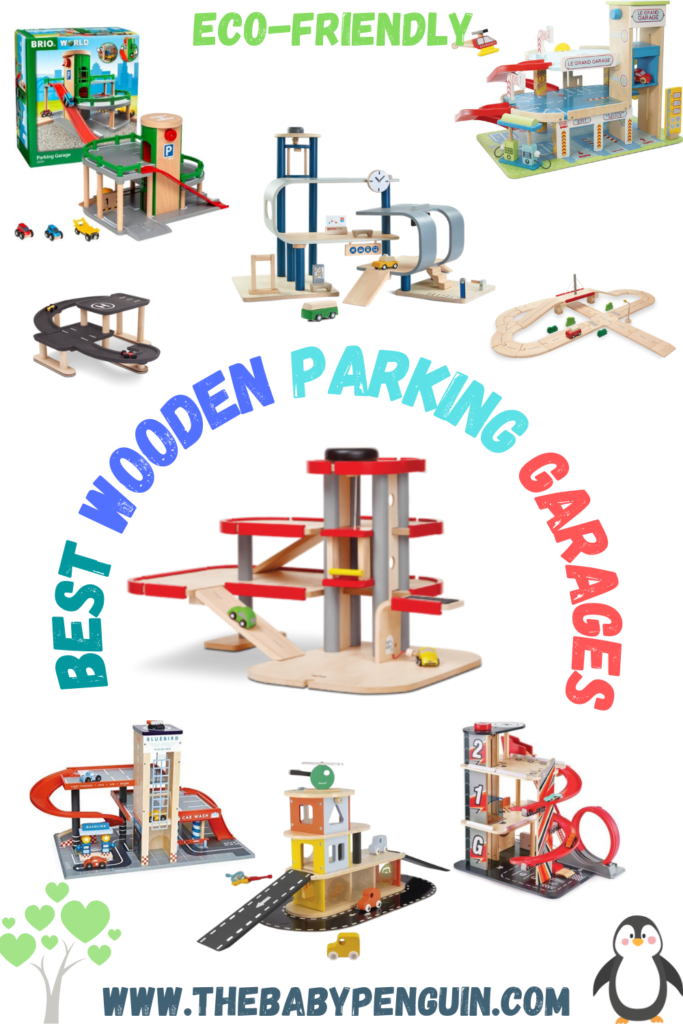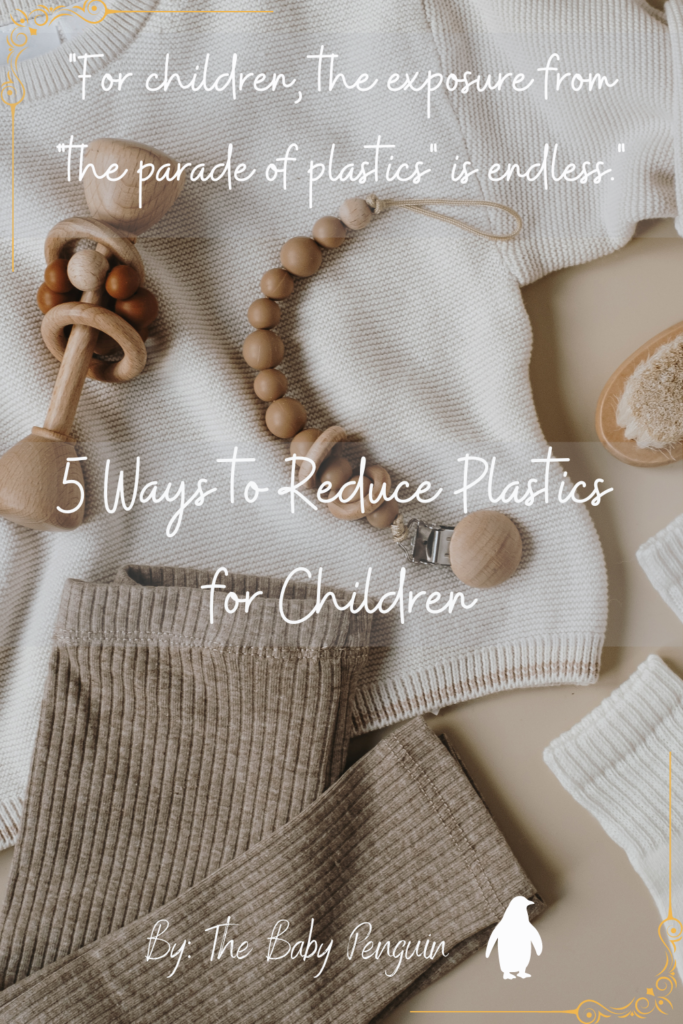Table of Contents
Toggle“What Is Montessori Preschool?” | FAQ & Complete Guide
Montessori preschool is a type of early childhood education that was developed by Dr. Maria Montessori in the early 1900s. The Montessori method is based on the idea that children learn best through hands-on experience and exploration, and that they should be allowed to learn at their own pace. In this article, we will explore what Montessori preschool is and 20 of its top benefits. Montessori preschool is an educational approach that emphasizes hands-on experiences and self-directed learning. It was developed by Dr. Maria Montessori in the early 1900s.
Montessori preschools are designed to create a nurturing environment that encourages children to explore, learn, and develop independence. They typically have a lower student-to-teacher ratio than traditional preschools. The Montessori approach to education emphasizes the development of the whole child, including physical, social, emotional, and cognitive development. Children in Montessori preschools are encouraged to learn through their own natural curiosity and to explore their environment with all their senses.
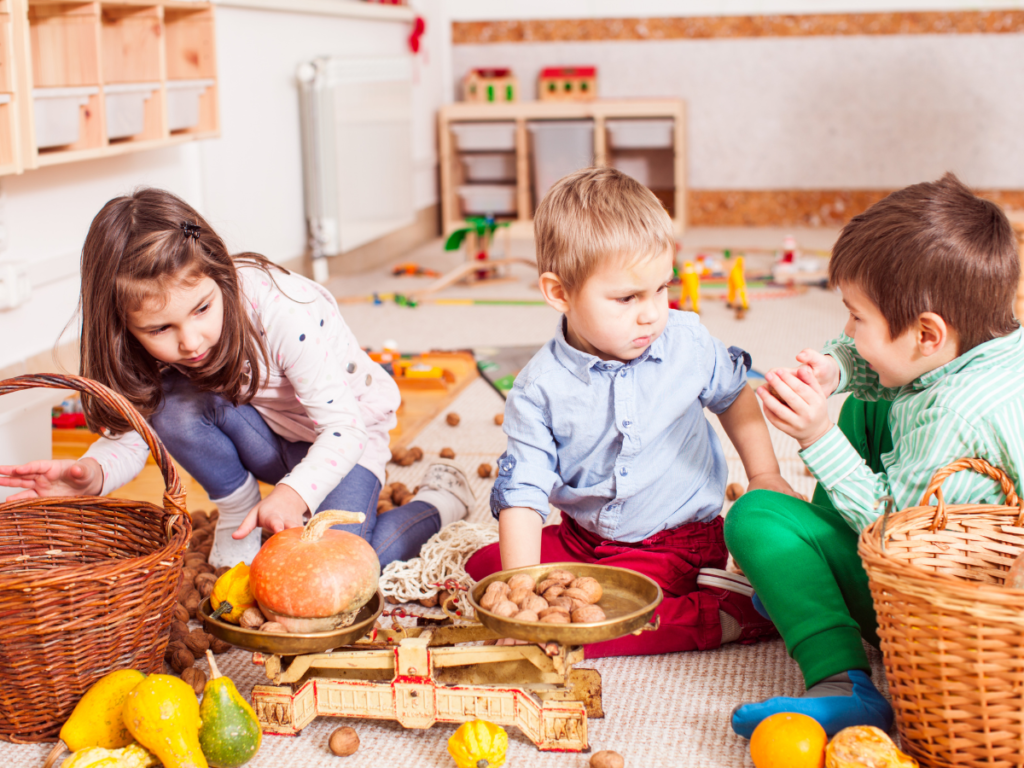
What Materials are utilized in Montessori?
The Montessori materials are designed to be hands-on and interactive, allowing children to learn through experience. Montessori preschools promote social skills, including cooperation, communication, and conflict resolution. They also encourage independence in children, teaching them self-care skills, decision-making, and problem-solving. Montessori preschools foster creativity, allowing children to explore their imaginations and express themselves through various forms of art and music. They also promote language development through conversation, storytelling, and exposure to a rich language environment.
Montessori preschools use concrete materials to teach mathematical concepts, which helps children to develop a strong foundation in math. They also promote cultural awareness and understanding, exposing children to diverse cultures and traditions. Montessori preschools emphasize the importance of environmental awareness, teaching children to respect and care for the environment. They promote emotional intelligence, helping children to understand and manage their emotions. Montessori preschools help children to develop confidence in their abilities, which is essential for lifelong learning. They teach responsibility, helping children to understand the consequences of their actions and to take responsibility for their own learning. Montessori preschools promote critical thinking skills, which are essential for problem-solving and decision-making. If you’re looking for an educational approach that prioritizes your child’s holistic development and fosters a love of learning, Montessori preschool may be the perfect choice for your family.
What is Montessori Preschool?
Montessori preschools are designed to create a nurturing environment that encourages children to explore, learn, and develop independence. They are typically smaller than traditional preschools, with a lower student-to-teacher ratio. Montessori classrooms are designed to be child-centered, with a focus on self-directed activity and collaborative learning.
The Montessori approach to education emphasizes the development of the whole child – physical, social, emotional, and cognitive. Children are encouraged to learn through their own natural curiosity and to explore their environment with all their senses. The Montessori materials are designed to be hands-on and interactive, allowing children to learn through experience.
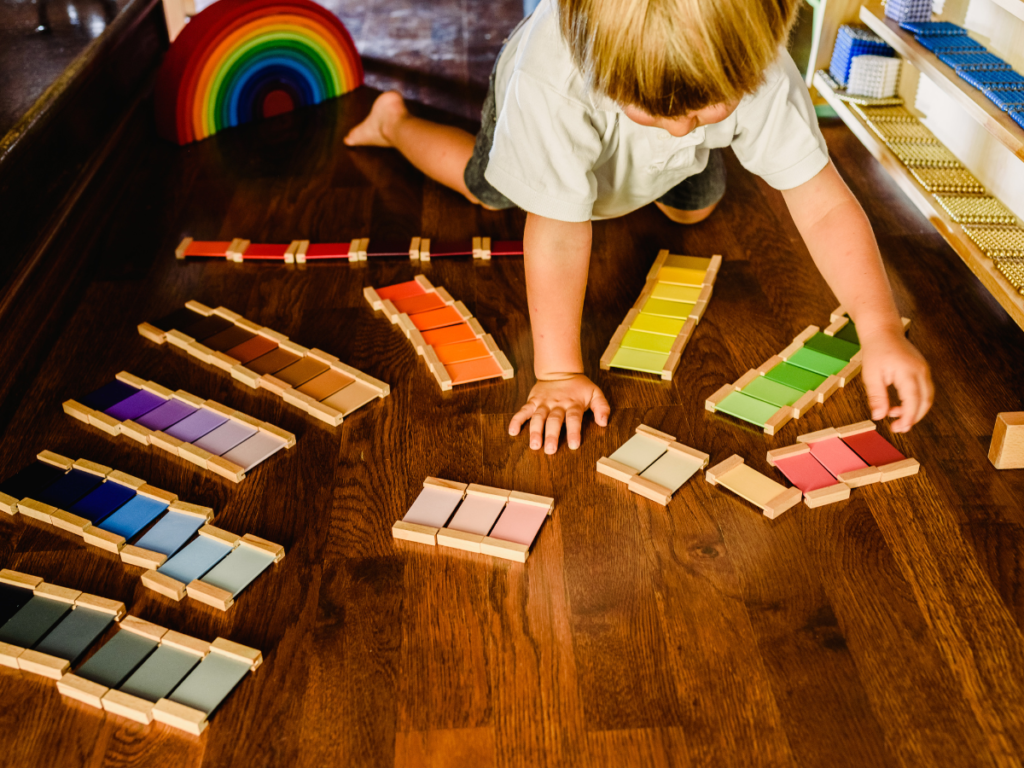
5 Questions to Ask When looking for a Montessori School
- What is the school’s approach to education and how does it align with the Montessori philosophy? As Montessori schools can vary in their approach and implementation of the Montessori philosophy, it’s important to understand how the school’s approach to education aligns with the Montessori philosophy.
- What is the school’s accreditation status? Accreditation can provide assurance that the school meets certain standards of quality and excellence and that the Montessori program is being implemented effectively.
- What is the student-to-teacher ratio? A lower student-to-teacher ratio can allow for more individualized attention and support for students, which can be beneficial in a Montessori environment where self-directed learning is emphasized.
- What are the teacher’s training and experience in the Montessori approach? Teachers who have been trained and have experience in the Montessori approach can provide a richer and more authentic Montessori experience for students.
- What is the school’s approach to discipline and conflict resolution? Montessori schools typically promote a peaceful and respectful environment, and it’s important to understand how the school approaches to discipline and conflict resolution to ensure it aligns with your values and expectations.
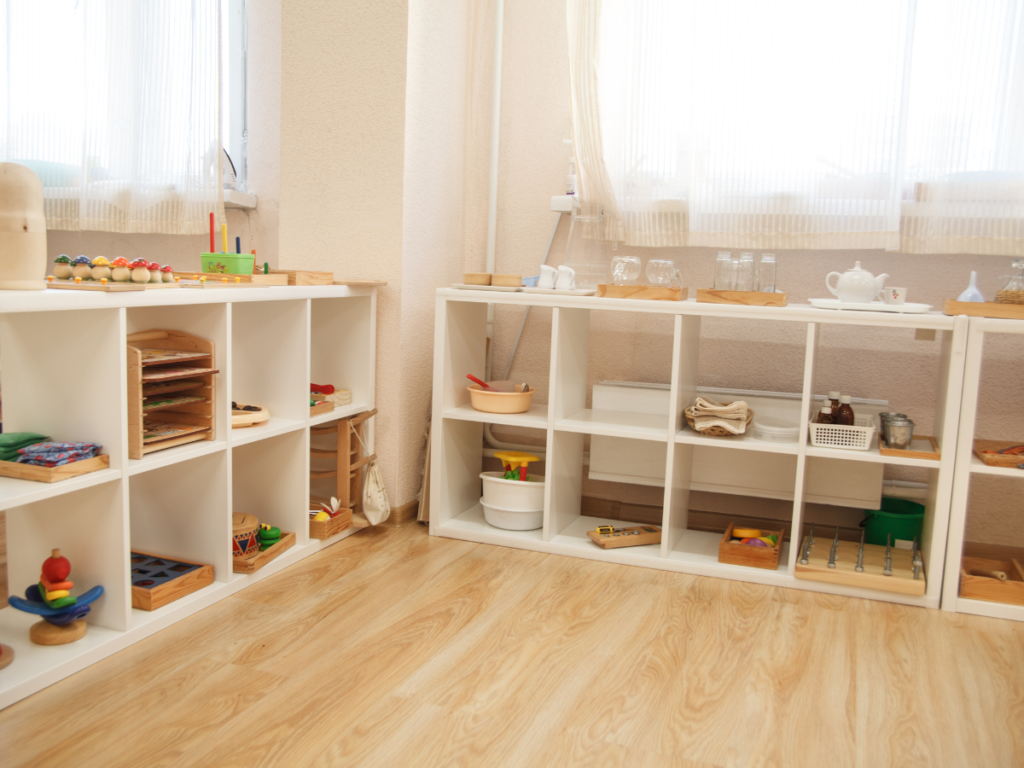
What to look for in a Montessori Classroom?
When observing a Montessori classroom, there are several key things to look for that can indicate whether the classroom is providing an effective Montessori education. Here are some important things to look for:
- Child-Centered Environment: A Montessori classroom should be designed to be child-centered, with child-sized furniture and materials that are accessible to children.
- Hands-On Materials: Montessori materials are designed to be hands-on and interactive, allowing children to learn through experience. Look for a variety of materials that cover different subjects such as language, math, practical life, and sensorial exploration.
- Order and Organization: Montessori classrooms are typically organized and orderly, with materials arranged in a logical and structured way. This allows children to easily find and use materials independently.
- Mixed-Age Groupings: Montessori classrooms typically have mixed-age groupings, allowing younger children to learn from older children and older children to reinforce their knowledge by helping younger ones.
-
Freedom of Movement: Children in a Montessori classroom should be free to move around and explore at their own pace. This helps to promote independence and self-directed learning.
- Student-Directed Learning: A Montessori classroom should encourage self-directed learning, allowing children to choose their own activities and work at their own pace.
- Teacher as Guide: The teacher in a Montessori classroom is more of a guide than a traditional teacher. Look for a teacher who is observing, interacting, and guiding students as they work independently.
- Focus on the Whole Child: Montessori education prioritizes the development of the whole child, including physical, social, emotional, and cognitive development. Look for evidence that the classroom is addressing all aspects of the child’s development.
- Respectful and Peaceful Environment: Montessori classrooms promote a peaceful and respectful environment. Look for evidence that children are interacting with each other in a positive and respectful manner.
- Student Progress: Finally, look for evidence that children are making progress and achieving their goals. A good Montessori classroom should allow children to learn and progress at their own pace, while also providing appropriate challenges to keep them engaged and motivated.
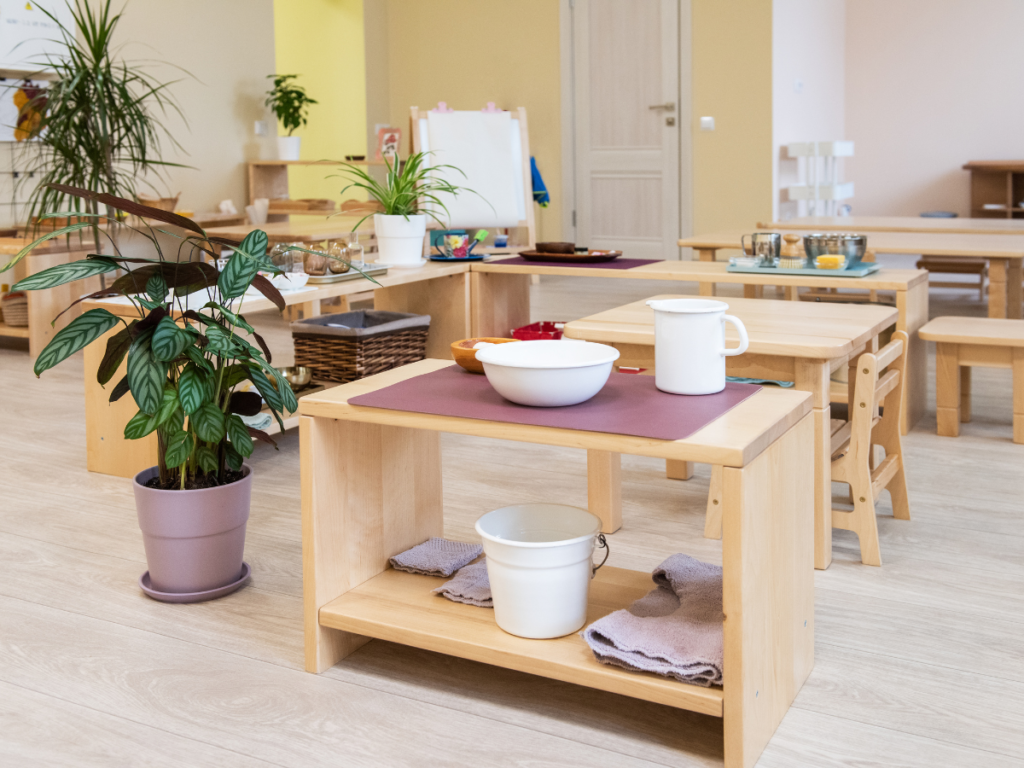
How is a Montessori Classroom Designed Different than a Traditional Classroom?
A Montessori classroom is designed differently than a traditional classroom in several ways, as the Montessori approach emphasizes child-centered learning and development. Here are some key differences:
Environment:
-
- The Montessori classroom is designed to be a prepared environment that is carefully curated to meet the needs of the children in the class. It typically includes child-sized furniture, open spaces for movement and exploration, and a variety of hands-on materials that are easily accessible to the children. The traditional classroom is often designed with rows of desks and a teacher’s desk at the front.
Learning Materials:
- In a Montessori classroom, the learning materials are designed to be self-correcting and to encourage independent exploration and discovery. Children are encouraged to choose their own activities and work at their own pace. In a traditional classroom, the learning materials are often teacher-directed and designed to support a specific curriculum.
Teaching Approach:
- The Montessori approach emphasizes a child-centered approach to learning, with teachers acting as guides and facilitators rather than lecturers. Children are encouraged to explore and discover on their own, with teachers providing guidance and support as needed. In a traditional classroom, teachers typically lead the learning activities and direct the pace of instruction.
Multi-age Groupings:
- In a Montessori classroom, children of different ages are often grouped together in a single classroom, allowing for peer-to-peer learning and socialization. This also provides opportunities for younger children to learn from older ones, and for older children to take on leadership roles. In a traditional classroom, children are typically grouped by age.
Overall, the Montessori classroom is designed to support the child’s natural love of learning and to provide opportunities for exploration, discovery, and self-directed learning, while the traditional classroom is often more focused on teacher-directed instruction and a set curriculum.
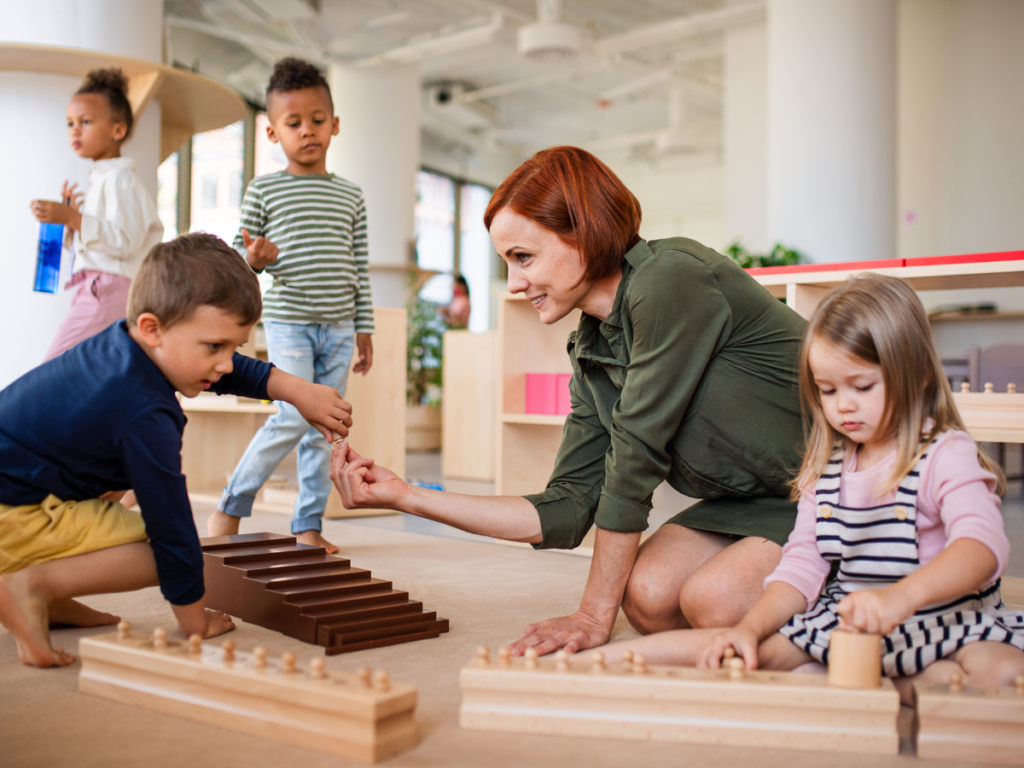
Top 21 Benefits of Montessori Preschool
1. Self-Directed Learning:
Montessori preschools promote self-directed learning, which allows children to learn at their own pace and explore their interests. Self-directed learning is a key aspect of Montessori education and is one of the most significant differences between Montessori preschools and traditional preschools. In a Montessori classroom, children are encouraged to take responsibility for their own learning and are given the freedom to choose their own activities. Self-directed learning in Montessori preschools involves allowing children to learn at their own pace and explore their interests. The teacher acts as a guide and provides support when needed, but ultimately it is up to the child to decide what activities to work on and for how long. This allows children to take ownership of their learning and can help to foster a love of learning that will last a lifetime.
Why is self-directed learning mportant?
Self-directed learning is especially important in Montessori preschools because it allows children to develop their own interests and strengths. Each child is unique and will have different strengths and interests, and self-directed learning allows them to explore these areas in a way that is meaningful to them. This can help to build confidence and self-esteem, and can also lead to a deeper understanding of the subject matter. Self-directed learning also helps to promote independence and autonomy in children. By giving children the freedom to make their own choices and take responsibility for their learning, Montessori preschools are helping to prepare children for success in the future. Self-directed learners are better able to set goals, manage their time, and take initiative – all skills that will be valuable throughout their lives.
In summary, self-directed learning is a key component of Montessori preschools and is an effective way to foster a love of learning, promote independence and autonomy, and help children develop their own interests and strengths. By allowing children to learn at their own pace and explore their interests, Montessori preschools are helping to prepare children for a lifetime of success.
2. Hands-On Learning:
Montessori classrooms provide hands-on learning experiences, which help children develop their senses and enhance their understanding of the world around them. Hands-on learning is a fundamental component of the Montessori approach to education. In Montessori classrooms, children are provided with a wide variety of hands-on learning experiences that help them to develop their senses, enhance their understanding of the world around them, and promote their cognitive, social, and emotional development.
Hands-on learning in Montessori classrooms involves the use of specially designed materials and activities that are specifically tailored to children’s developmental stages and interests. These materials are designed to be engaging, and interactive, and promote exploration, experimentation, and discovery. They are also designed to be self-correcting, allowing children to learn from their own mistakes and develop a sense of autonomy and independence.
What topics do the hands-on materials cover?
The hands-on materials used in Montessori classrooms cover a wide range of subjects, including language, math, science, geography, art, and practical life skills. For example, children might use sandpaper letters to learn the alphabet, work with counting beads to develop math skills or use a globe to learn about different countries and cultures.
By providing children with hands-on learning experiences, Montessori classrooms help children to develop their senses and enhance their understanding of the world around them. This approach to learning helps children to develop a deeper understanding of concepts and ideas, and also helps to foster creativity, critical thinking, problem-solving, and decision-making skills.
In summary, hands-on learning is a key component of Montessori classrooms and is an effective way to promote children’s cognitive, social, and emotional development. By providing children with hands-on learning experiences, Montessori classrooms help children to develop a deeper understanding of the world around them and to develop the skills and abilities they need to succeed outside the classroom.
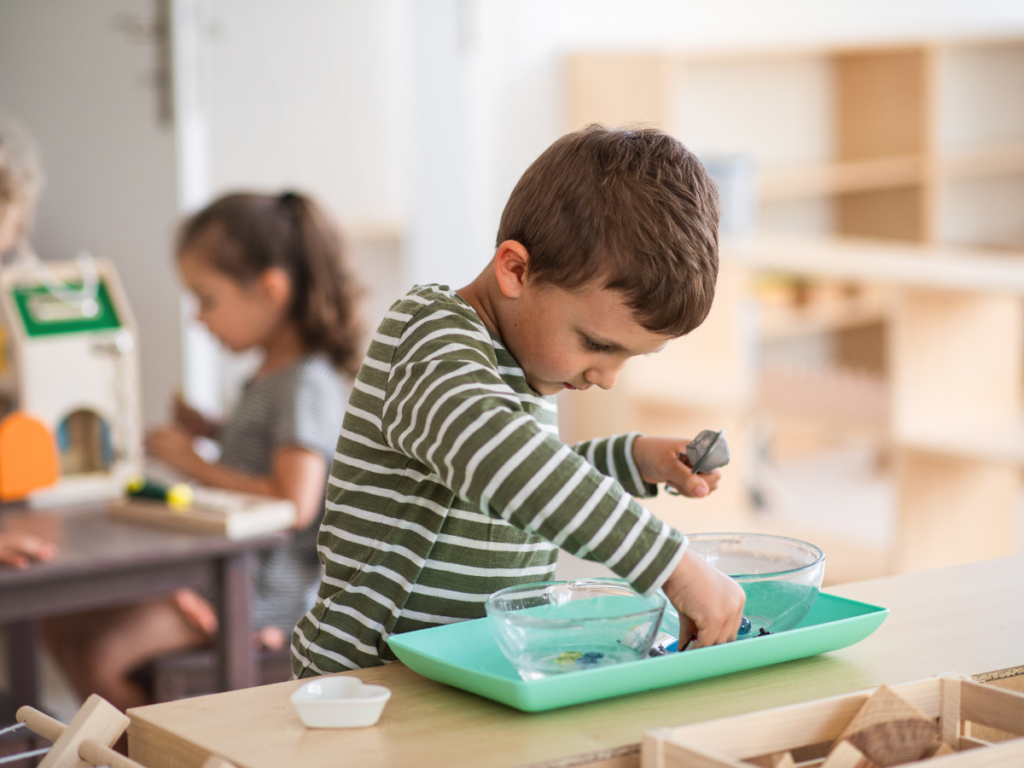
3. Individualized Attention:
With a low student-to-teacher ratio, Montessori preschools provide individualized attention to each child, helping them to reach their full potential. Individualized attention is a cornerstone of Montessori education, and it is one of the key factors that sets Montessori preschools apart from traditional preschools. In Montessori classrooms, a low student-to-teacher ratio is maintained to ensure that each child receives individualized attention and support, which allows them to reach their full potential.
The Montessori approach recognizes that each child is unique, with their own strengths, weaknesses, interests, and learning styles. By providing individualized attention, Montessori preschools are able to tailor their teaching methods and materials to each child’s specific needs, abilities, and interests. In Montessori classrooms, teachers work closely with each child to observe their progress, identify areas where they may need additional support or challenge, and adjust their approach accordingly. This individualized attention helps children to feel valued and supported and can help to boost their confidence and self-esteem.
What about the student-to-teacher ratio?
The low student-to-teacher ratio in Montessori preschools also helps to foster strong relationships between children and their teachers. Teachers are able to get to know each child on a personal level and are able to provide a nurturing and supportive environment where children feel safe and encouraged to explore and learn. In addition, the individualized attention provided in Montessori preschools helps to promote children’s academic, social, and emotional development. Children are able to learn at their own pace, without the pressure to keep up with their peers or to meet strict academic standards. This approach allows children to develop a love of learning and to become lifelong learners.
In summary, individualized attention is a core component of the Montessori approach to education, and it is an effective way to help children reach their full potential. By providing a low student-to-teacher ratio, Montessori preschools are able to tailor their teaching methods and materials to each child’s specific needs, abilities, and interests, which helps to promote their academic, social, and emotional development.
4. Independence:
Montessori preschools encourage independence in children, teaching them self-care skills, decision-making, and problem-solving. Independence is a key value in Montessori preschools, and it is actively encouraged and nurtured in children. The Montessori approach recognizes that children have a natural desire to be independent and self-sufficient, and provides opportunities for children to develop these skills in a supportive and nurturing environment.
One of the ways that Montessori preschools promote independence is by teaching children self-care skills. Children are encouraged to take responsibility for their own hygiene, such as washing their hands, dressing themselves, and using the bathroom. This helps children to develop a sense of autonomy and self-reliance, and also promotes their physical and emotional well-being.
Why is independence important?
Montessori preschools also encourage independence by teaching children decision-making and problem-solving skills. Children are given opportunities to make choices throughout the day, such as choosing their own work activities, selecting their own snacks, and deciding how to spend their free time. This helps children to develop their decision-making skills and to become more confident and independent. In addition, Montessori classrooms are designed to be child-friendly and accessible, with furniture and materials that are appropriate for children’s sizes and abilities. This allows children to move around the classroom freely and to choose their own work activities, which helps to promote their independence and self-direction.
Overall, promoting independence is a core value of the Montessori approach to education. By teaching children self-care skills, decision-making, and problem-solving, Montessori preschools help children to develop a sense of autonomy and self-reliance, which is essential for their success both inside and outside of the classroom. Moreover, by incorporating this value into their curriculum, Montessori preschools provide children with a solid foundation for becoming responsible, independent adults.
5. Social Skills:
Montessori classrooms promote social skills, including cooperation, communication, and conflict resolution. Social skills refer to the ability to effectively interact with others, communicate ideas, and build positive relationships. These skills are essential for success in all areas of life, including personal and professional relationships. Montessori classrooms are designed to promote social skills development in children through a variety of activities and techniques.
One important aspect of Montessori classrooms is the emphasis on cooperation. Students are encouraged to work together on projects and to support each other in their learning. This fosters a sense of teamwork and collaboration and helps children develop important social skills such as sharing, compromising, and respecting others’ opinions. Another key aspect of Montessori classrooms is the focus on communication. Children are taught how to express themselves clearly and effectively, both verbally and non-verbally. They learn how to listen actively, ask questions, and respond appropriately to others. These skills are crucial for building positive relationships and resolving conflicts in a constructive way.
How do children deal with conflict in the classroom?
Conflict resolution is also a key area of focus in Montessori classrooms. Children are taught how to identify and manage their emotions, and how to approach conflicts with empathy and respect. They learn how to negotiate and find mutually beneficial solutions, rather than resorting to aggression or avoidance. Overall, the social skills developed in Montessori classrooms are essential for success in all areas of life. By promoting cooperation, communication, and conflict resolution, Montessori education prepares children to become confident, effective communicators and problem-solvers, who are able to build positive relationships and navigate the complexities of the world around them.
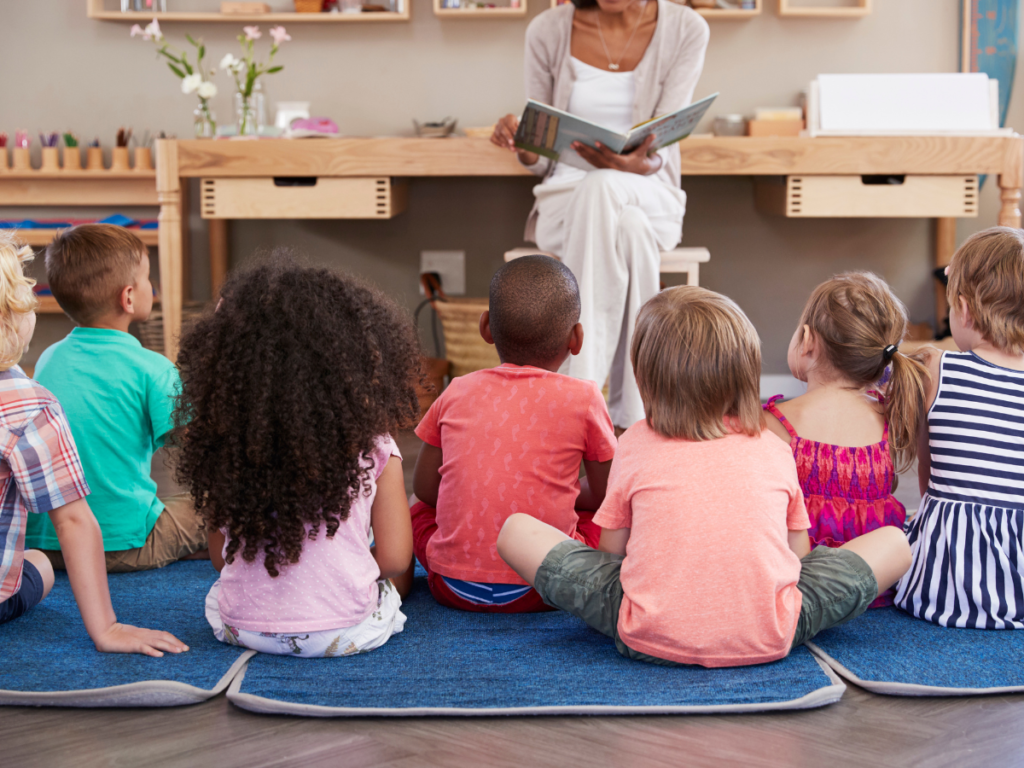
6. Respect:
Montessori classrooms emphasize respect for others, the environment, and oneself. Respect is a fundamental value that is emphasized in Montessori classrooms. Children are taught to value and appreciate the worth of themselves, others, and the environment. Respect is a key component of creating a positive and supportive learning environment where children can feel valued and safe.
In Montessori classrooms, children are taught to respect others by learning how to interact with their peers in a positive and supportive way. They are encouraged to develop empathy and understanding towards others and to value and celebrate diversity. Through activities that promote cooperation, teamwork, and communication, children learn how to work together with others in a respectful and collaborative manner.
What about the environment?
Montessori classrooms also promote respect for the environment. Children are taught to appreciate and care for nature, and to understand the importance of preserving the environment for future generations. They are encouraged to be responsible stewards of the environment by participating in activities such as recycling, gardening, and conservation efforts.
Finally, Montessori education promotes respect for oneself. Children are taught to develop a positive self-image, recognize and value their unique strengths and talents, and to set and achieve personal goals. Through activities that promote self-reflection, self-expression, and self-care, children learn to develop a strong sense of self-worth and self-respect. In summary, respect is a fundamental value that is emphasized in Montessori classrooms. Through activities that promote respect for others, the environment, and oneself, children develop the skills and values necessary to become responsible, caring, and empathetic members of society.

7. Creativity:
Montessori preschools foster creativity, allowing children to explore their imaginations and express themselves through various forms of art and music. Creativity is a fundamental aspect of Montessori education. Montessori preschools provide an environment that encourages children to explore their imaginations and express themselves through various forms of art and music. This approach allows children to develop their creativity in a natural and organic way.
In Montessori preschools, children are encouraged to explore and experiment with various art materials, such as paint, clay, and collage. They are given the freedom to create their own unique works of art, rather than being directed by a teacher. This approach allows children to develop their own sense of creativity and self-expression, while also building important skills such as fine motor coordination and problem-solving.
How is music incorporated into the classroom?
Music is also an important aspect of creativity in Montessori preschools. Children are introduced to various types of music from different cultures and time periods and are encouraged to create their own music through singing, playing instruments, and movement. This approach allows children to develop their sense of rhythm, melody, and harmony, while also fostering their creativity and self-expression.
Montessori preschools also emphasize the importance of imaginative play. Children are encouraged to use their imaginations to create their own stories and scenarios, using props and costumes to bring their ideas to life. This approach allows children to develop their creativity and storytelling skills, while also building important social and emotional skills such as empathy and collaboration. In summary, Montessori preschools provide an environment that fosters creativity and self-expression through art, music, and imaginative play. By encouraging children to explore their imaginations and express themselves in a variety of ways, Montessori education helps children develop their own unique creative talents, while also building important skills and values that will serve them well throughout their lives.
8. Multisensory Learning:
The Montessori materials are designed to provide multisensory learning experiences, which help children to develop their senses and enhance their learning. Multisensory learning is an important aspect of Montessori education. The Montessori materials are designed to provide children with a variety of sensory experiences that help to enhance their learning and development. This approach recognizes that children learn best when they are able to use all of their senses to explore and understand the world around them.
In Montessori classrooms, children are provided with a range of materials and activities that engage their senses in different ways. For example, the materials are designed to be visually appealing, with bright colors and interesting textures that children can touch and feel. They are also designed to be self-correcting, which means that children can learn through trial and error, using their sense of touch and hand-eye coordination to figure out how to use the materials correctly.
What are auditory and olfactory experiences in the Montessori Classroom?
In addition to visual and tactile experiences, Montessori classrooms also provide children with auditory and olfactory experiences. For example, children might listen to music or spoken language, or engage in activities that involve different smells and tastes. These experiences help to stimulate children’s brains and enhance their learning, making the learning process more engaging and memorable. Multisensory learning is particularly beneficial for children with different learning styles or learning difficulties. By providing a range of sensory experiences, Montessori education is able to accommodate different learning needs and help all children to reach their full potential.
In summary, multisensory learning is an important aspect of Montessori education. By providing children with a range of sensory experiences, Montessori classrooms help to enhance learning and development, while accommodating different learning needs and styles. Through engaging and memorable multisensory experiences, Montessori education helps children to develop a love of learning that will serve them well throughout their lives.
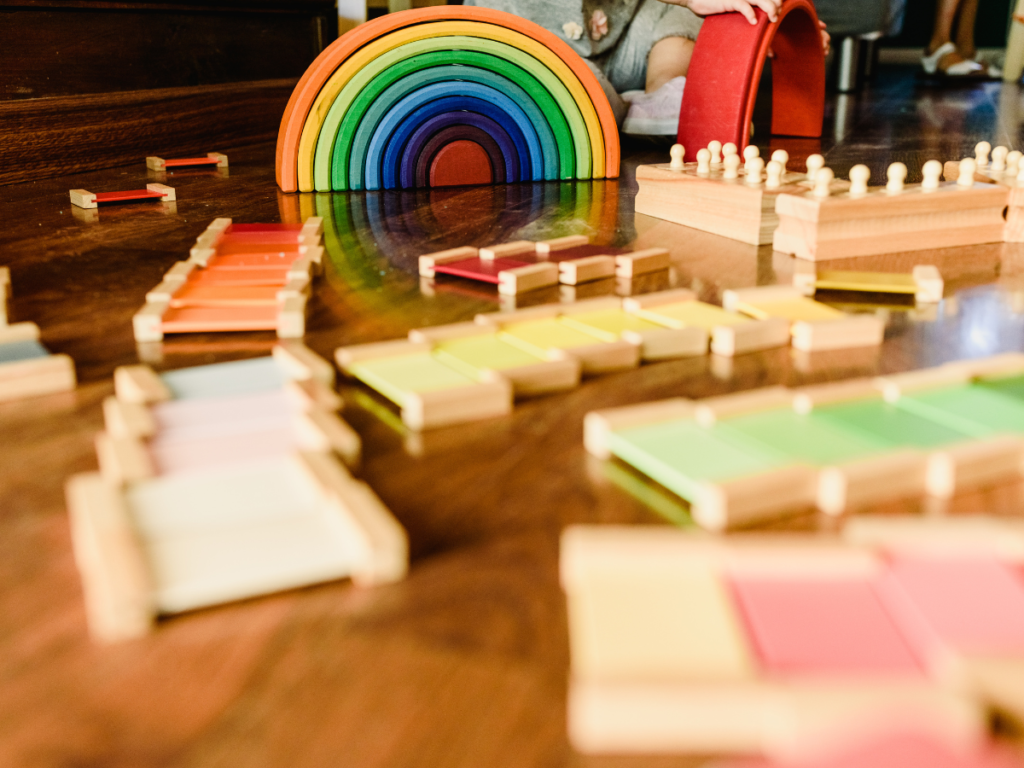
9. Language Skills:
Montessori preschools promote language development through conversation, storytelling, and exposure to a rich language environment. Language development is a key component of Montessori education. Montessori preschools promote language skills in a variety of ways, including through conversation, storytelling, and exposure to a rich language environment. In Montessori preschools, children are encouraged to engage in conversation with their teachers and peers. They learn to express themselves through language and to listen and respond to others in a respectful and attentive manner. This approach helps children to develop their language skills, as well as their social and emotional skills such as empathy, communication, and cooperation.
Storytelling is also an important aspect of language development in Montessori preschools. Children are exposed to a variety of stories and literature from different cultures and time periods, helping to broaden their understanding of the world and develop their language skills. They also have the opportunity to create their own stories and share them with others, fostering their creativity and self-expression.
Why a rich language environment?
Montessori preschools provide a rich language environment, with a focus on vocabulary development and literacy skills. Children are exposed to a variety of words and phrases and are taught how to use language to describe their thoughts and experiences. They are also introduced to the written word, learning to recognize and write letters and words, and eventually to read and write independently.
In addition to spoken and written language, Montessori preschools also incorporate sign language and foreign language instruction. By exposing children to different languages and forms of communication, Montessori education helps to broaden their understanding of the world and develop their language skills in a variety of ways. In summary, Montessori preschools promote language development through conversation, storytelling, and exposure to a rich language environment. By providing a supportive and engaging learning environment, Montessori education helps children to develop strong language skills that will serve them well throughout their lives.
10. Mathematical Skills:
Montessori preschools use concrete materials to teach mathematical concepts, which helps children to develop a strong foundation in math. Mathematical skills are an important part of Montessori education. Montessori preschools use a hands-on, experiential approach to teach mathematical concepts, which helps children to develop a strong foundation in math. One of the key features of Montessori education is the use of concrete materials to teach mathematical concepts. These materials are designed to be visually appealing and engaging, with different shapes, sizes, and colors that children can manipulate and explore. By using concrete materials, children are able to see and touch the concepts they are learning, which helps them to understand mathematical concepts at a deeper level.
In Montessori preschools, children start by learning the basics of mathematics, such as counting and number recognition. They then move on to more advanced concepts, such as addition, subtraction, multiplication, and division. The materials used to teach these concepts are designed to be self-correcting, which means that children can learn through trial and error, without the need for constant adult intervention.
How do Montessori Children tackle problems?
Montessori education also emphasizes problem-solving and critical thinking skills, which are essential for success in mathematics. Children are encouraged to work through problems independently, using the materials and concepts they have learned to find solutions. This approach helps children to develop their analytical skills and fosters a love of learning that will serve them well throughout their lives.
By using a hands-on, experiential approach to teach mathematical concepts, Montessori education helps children to develop a strong foundation in math. This foundation will serve them well as they progress through their academic careers and into adulthood, helping them to succeed in a wide variety of fields and pursuits.
In summary, Montessori preschools use concrete materials to teach mathematical concepts, which helps children to develop a strong foundation in math. By using a hands-on, experiential approach, Montessori education helps children to understand mathematical concepts at a deeper level, fostering problem-solving and critical thinking skills that will serve them well throughout their lives.
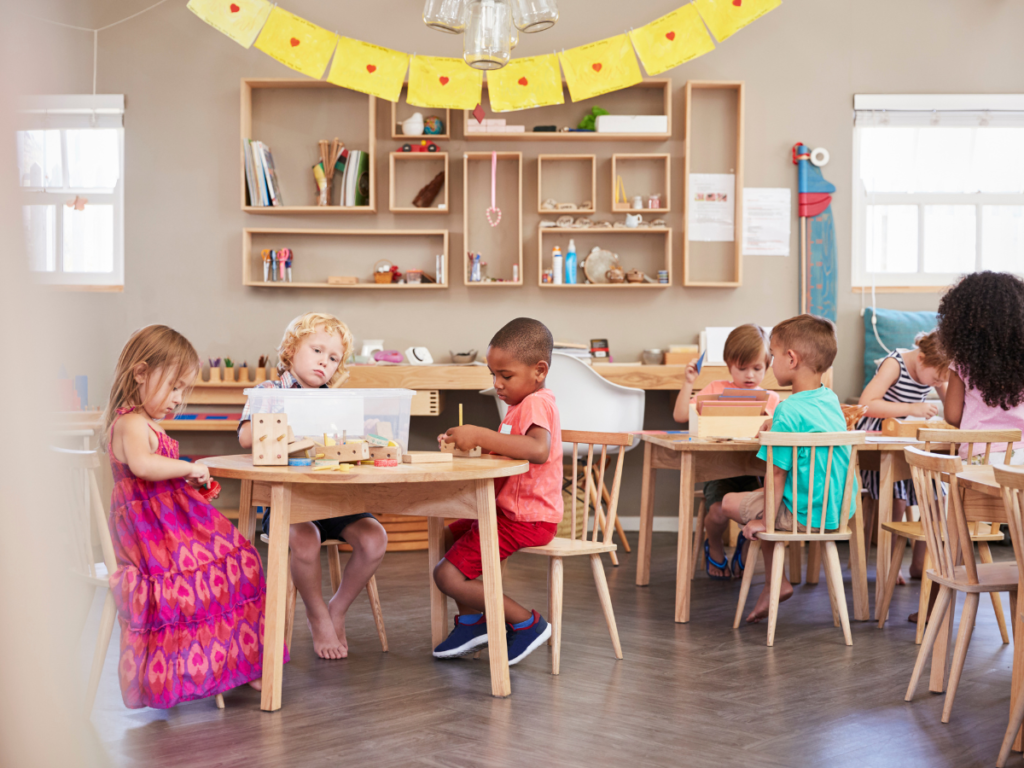
11. Cultural Awareness:
Montessori preschools promote cultural awareness and understanding, exposing children to diverse cultures and traditions. Cultural awareness and understanding are important aspects of Montessori education. Montessori preschools promote cultural awareness by exposing children to diverse cultures and traditions, and by encouraging them to appreciate and respect cultural differences.
One of the key ways that Montessori preschools promote cultural awareness is through the use of multicultural materials and activities. Children are exposed to materials and activities from different cultures and traditions, which helps to broaden their understanding of the world and develop an appreciation for diversity. This includes learning about different cultural holidays, foods, music, and art. Montessori education also emphasizes respect for cultural differences. Children are encouraged to understand and appreciate different cultures and to be respectful of cultural traditions and beliefs. This approach helps children to develop empathy and understanding, which are important for building positive relationships with people from different backgrounds.
Understanding their own cultural identity is important
In addition to promoting cultural awareness and understanding, Montessori education also encourages children to explore their own cultural identity. Children are encouraged to share their own cultural traditions and experiences with their classmates, helping to foster a sense of community and inclusivity. By promoting cultural awareness and understanding, Montessori education helps children to develop important life skills, including empathy, understanding, and respect for diversity. These skills will serve them well throughout their lives, helping them to build positive relationships with people from different backgrounds and to navigate a rapidly changing world.
In summary, Montessori preschools promote cultural awareness and understanding by exposing children to diverse cultures and traditions, encouraging respect for cultural differences, and fostering a sense of community and inclusivity. By promoting cultural awareness, Montessori education helps children to develop important life skills that will serve them well throughout their lives.
12. Environmental Awareness:
Montessori preschools emphasize the importance of environmental awareness, teaching children to respect and care for the environment. Environmental awareness is an important aspect of Montessori education. Montessori preschools emphasize the importance of respecting and caring for the environment and encourage children to take an active role in protecting the natural world. One of the key ways that Montessori preschools promote environmental awareness is through hands-on activities and experiences that allow children to connect with nature. Children are encouraged to explore the natural world, observe plants and animals, and learn about the interconnections between living things. This approach helps children to develop a deep appreciation for the natural world and understand the importance of protecting it.
Montessori education also emphasizes the importance of sustainability and conservation. Children are taught about the importance of reducing waste, conserving resources, and taking care of the planet. This includes activities like recycling, composting, and gardening, which help children to understand the impact of their actions on the environment.
Encouraging an Active role in the environment is important
In addition to promoting environmental awareness, Montessori education encourages children to take an active role in protecting the environment. Children are encouraged to participate in environmental projects and initiatives, such as cleaning up local parks or planting trees. This approach helps children to develop a sense of responsibility and empowerment and to understand that even small actions can make a big difference in protecting the environment.
By promoting environmental awareness and responsibility, Montessori education helps children to develop important life skills, including a sense of responsibility and stewardship, critical thinking skills, and problem-solving abilities. These skills will serve them well throughout their lives, helping them to make informed decisions and take action to protect the natural world. In summary, Montessori preschools promote environmental awareness by providing hands-on experiences that allow children to connect with nature, teaching the importance of sustainability and conservation, and encouraging children to take an active role in protecting the environment. By promoting environmental awareness and responsibility, Montessori education helps children to develop important life skills that will serve them well throughout their lives.
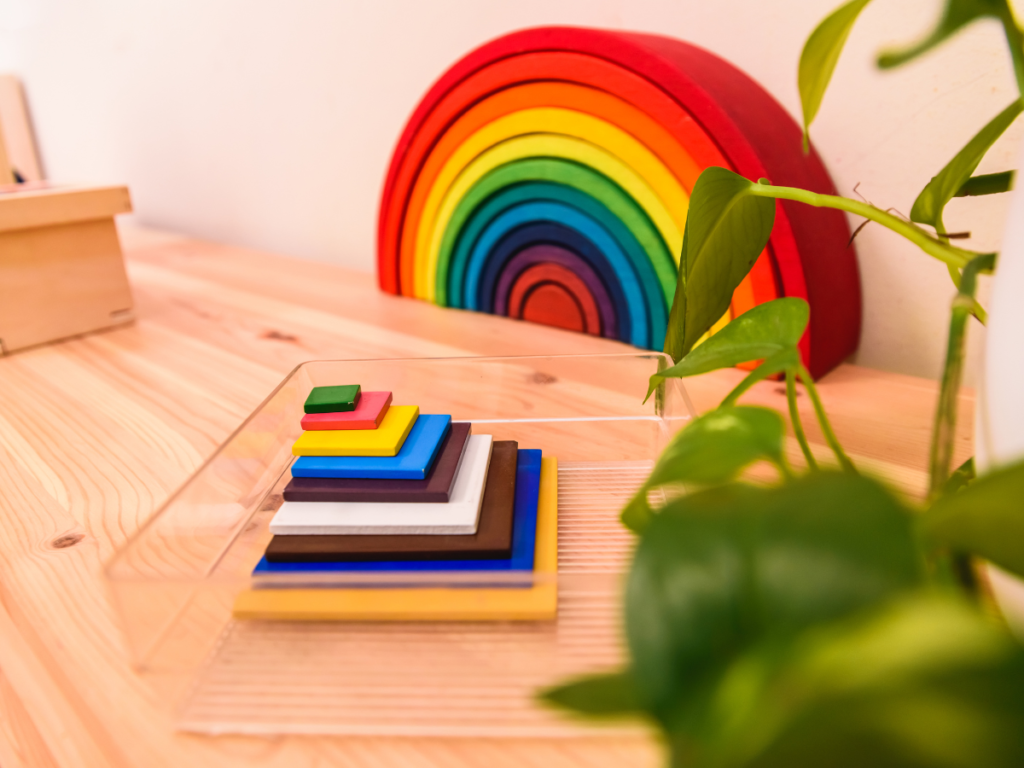
13. Emotional Intelligence:
Montessori preschools promote emotional intelligence, helping children to understand and manage their emotions. Emotional intelligence is an important aspect of Montessori education. Montessori preschools promote emotional intelligence by helping children to understand and manage their emotions, and by providing a safe and supportive environment for emotional growth.
One of the key ways that Montessori preschools promote emotional intelligence is through social-emotional learning activities. Children are taught to identify and express their emotions and to understand the emotions of others. This includes activities like role-playing, storytelling, and group discussions, which help children to develop empathy and self-awareness. Montessori education also emphasizes the importance of self-regulation and self-control. Children are taught strategies for managing their emotions, such as deep breathing, mindfulness, and positive self-talk. This approach helps children to develop resilience and coping skills, which will serve them well throughout their lives.
Positive Social interactions improve Emotional IQ
In addition to promoting emotional intelligence, Montessori education emphasizes the importance of positive social interactions. Children are encouraged to work together and support each other, helping to develop positive social skills and relationships. This approach helps children to develop a sense of community and belonging and to understand the importance of empathy and kindness. By promoting emotional intelligence and positive social interactions, Montessori education helps children to develop important life skills, including empathy, self-awareness, and self-regulation. These skills will serve them well throughout their lives, helping them to build positive relationships and to navigate the complex emotional landscape of the world around them.
In summary, Montessori preschools promote emotional intelligence by teaching children to understand and manage their emotions, emphasizing self-regulation and self-control, and promoting positive social interactions. By promoting emotional intelligence and positive social interactions, Montessori education helps children to develop important life skills that will serve them well throughout their lives.
14. Confidence:
Montessori preschools help children to develop confidence in their abilities, which is essential for lifelong learning. Confidence is a key aspect of Montessori education, as it helps children to develop a positive self-image and a belief in their abilities. Montessori preschools help children to develop confidence in their abilities through a variety of approaches.
One of the key ways that Montessori preschools promote confidence is by providing children with opportunities to explore and learn independently. The Montessori approach emphasizes child-led learning, allowing children to choose their own activities and work at their own pace. This approach helps children to develop a sense of ownership over their learning and to build confidence in their ability to explore and discover new things. In addition, Montessori education emphasizes the importance of hands-on learning experiences, which help children to develop a sense of mastery and accomplishment. Montessori materials are designed to be self-correcting, allowing children to learn from their mistakes and to build confidence in their abilities. This approach helps children to develop a growth mindset and to understand that mistakes are a natural part of the learning process.
Confidence creates future leaders
Montessori preschools also promote confidence by providing children with opportunities to take on leadership roles and contribute to the classroom community. Children are encouraged to share their ideas and to work collaboratively, helping to build confidence in their abilities to communicate and contribute to group projects. By promoting confidence in children, Montessori education helps to set a foundation for lifelong learning. Children who are confident in their abilities are more likely to take risks, to persist in the face of challenges, and embrace new learning opportunities. This can lead to greater success in academic and personal pursuits, and to a lifelong love of learning.
In summary, Montessori preschools promote confidence by providing opportunities for independent exploration and hands-on learning, emphasizing the importance of self-correction and a growth mindset, and providing opportunities for leadership and collaboration. By promoting confidence in children, Montessori education helps to set a foundation for lifelong learning and success.
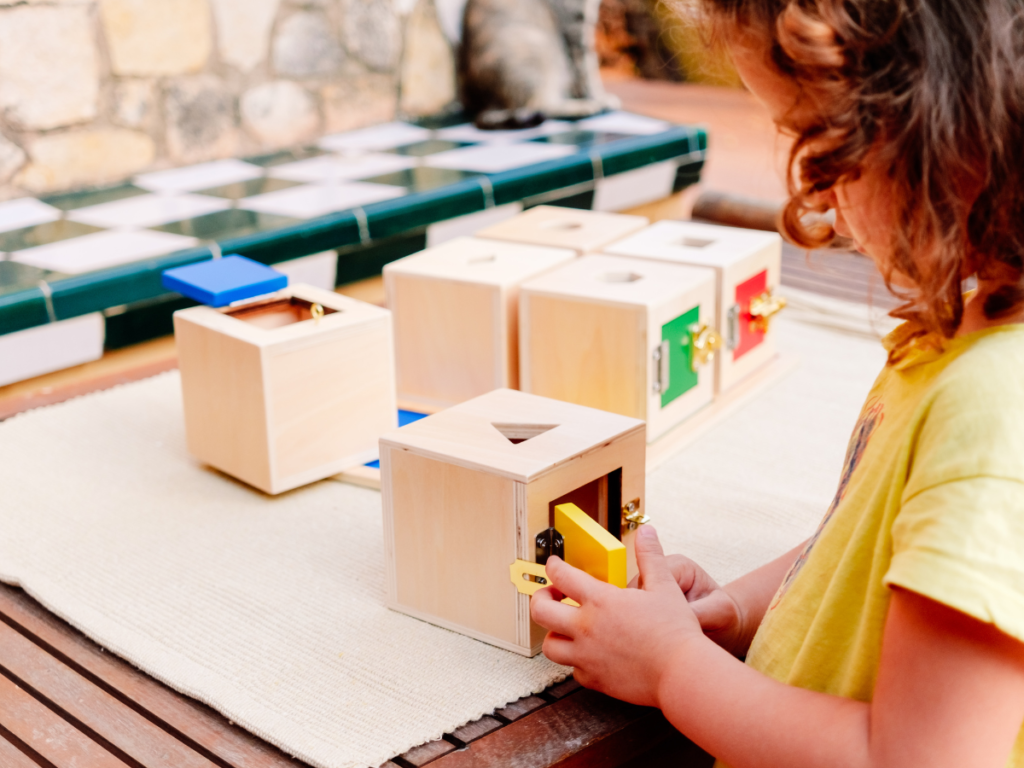
15. Responsibility:
Montessori preschools teach children responsibility, helping them to understand the consequences of their actions and to take responsibility for their own learning. Responsibility is an important value that Montessori preschools strive to instill in children. By teaching responsibility, children learn to take ownership of their actions and become accountable for their decisions. This skill is essential for success in both academic and personal pursuits.
Montessori education emphasizes personal responsibility by providing children with opportunities to make choices and learn from their mistakes. Children are encouraged to take responsibility for their own learning by choosing their own activities and working independently. This approach helps children to develop a sense of autonomy and to understand that they are responsible for their own progress and success. In addition to personal responsibility, Montessori education emphasizes social responsibility, teaching children to be aware of the needs of others and to contribute to their community. Children are encouraged to take part in group activities, share their ideas, and work collaboratively. This approach helps children to develop a sense of empathy and to understand that they have a role to play in the world around them.
Responsibility represents complete ownership
Montessori preschools also teach responsibility by emphasizing the consequences of actions. Children are encouraged to think through the potential outcomes of their decisions and to consider the impact that their actions may have on others. This approach helps children to develop a sense of accountability and to understand that their choices have real-world consequences. By teaching responsibility, Montessori education helps children to develop important life skills and to become responsible, accountable members of their communities. This can lead to greater success in academic and personal pursuits, as well as to a deeper sense of purpose and fulfillment.
In summary, Montessori preschools teach responsibility by emphasizing personal and social responsibility, teaching children to be aware of the consequences of their actions, and providing opportunities for children to make choices and learn from their mistakes. By instilling a sense of responsibility in children, Montessori education helps to set a foundation for lifelong success and personal fulfillment.
16. Critical Thinking:
Montessori preschools promote critical thinking skills, which are essential for problem-solving and decision-making. Critical thinking is an essential skill that allows individuals to analyze information, evaluate evidence, and make reasoned decisions. Montessori preschools promote critical thinking skills by providing children with opportunities to explore, discover, and problem-solve through hands-on experiences.
In Montessori classrooms, children are encouraged to ask questions, make observations, and explore their surroundings. This approach helps children to develop their curiosity and to become active learners. As children engage in these activities, they learn to identify patterns, make connections, and draw conclusions. This process of inquiry encourages critical thinking and helps children to develop problem-solving skills. Montessori preschools also provide children with opportunities to work independently and collaboratively. Children are encouraged to share their ideas and to work together to find solutions to problems. This approach helps children to develop their communication skills and to learn from the perspectives of others. By working collaboratively, children learn to consider multiple viewpoints and develop more robust solutions to problems.
Critical thinking leads to innovation and creativity
In addition, Montessori materials are designed to promote critical thinking skills. These materials allow children to manipulate objects, visualize concepts, and explore cause-and-effect relationships. By engaging with these materials, children learn to understand complex concepts and to think critically about how different elements relate to one another. By promoting critical thinking skills, Montessori preschools help children to develop the ability to analyze and evaluate information, make informed decisions, and solve problems. These skills are essential for success in both academic and personal pursuits and can lead to greater creativity, innovation, and success in life.
In summary, Montessori preschools promote critical thinking skills by encouraging inquiry-based learning, providing opportunities for collaboration, and using materials that promote problem-solving and decision-making. By developing critical thinking skills, children are better equipped to navigate the challenges of life and to achieve success in their academic and personal pursuits.
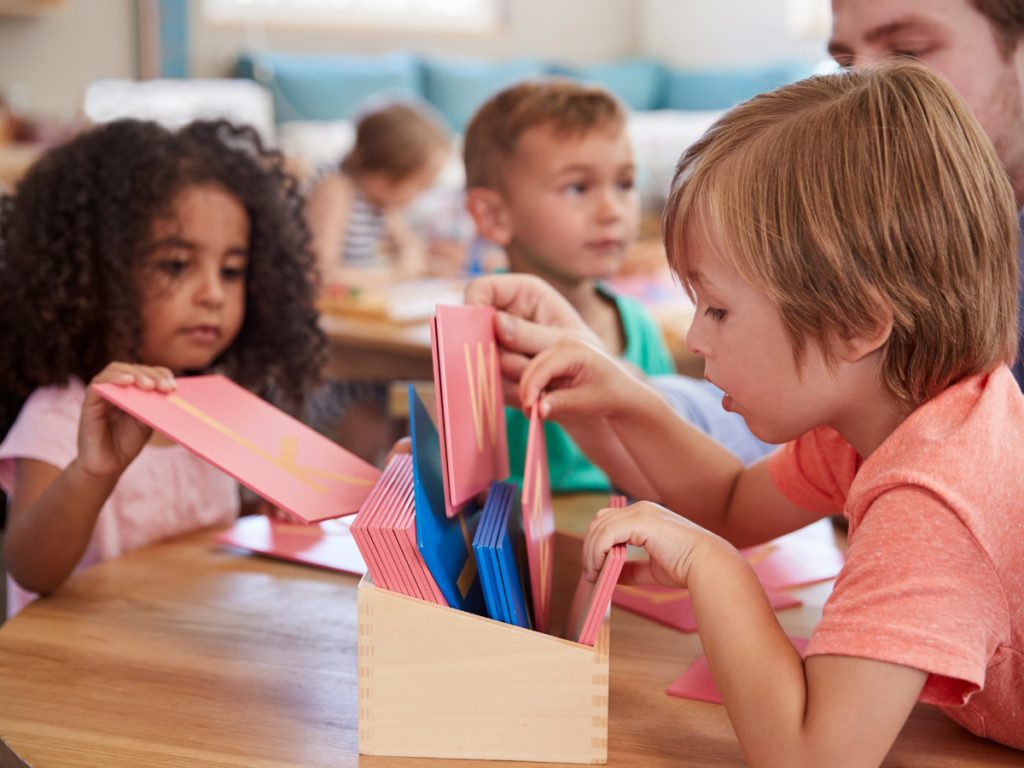
17. Positive Reinforcement:
Montessori preschools use positive reinforcement to encourage and motivate children to learn and grow. Positive reinforcement is an effective approach to encouraging and motivating children to learn and grow. In Montessori preschools, positive reinforcement is a crucial part of the learning process. The approach focuses on rewarding positive behavior and effort, rather than punishing negative behavior.
Montessori preschools use a variety of positive reinforcement techniques to motivate children, such as praise, encouragement, and recognition. Teachers offer positive feedback and acknowledge children’s efforts, achievements, and progress. They provide specific feedback that highlights what the child did well and how their actions contributed to their success. This approach encourages children to continue their efforts, build self-confidence, and develop a positive attitude toward learning.
Intrinsic Motivation leads to Future Success
In addition, Montessori preschools use intrinsic motivation to encourage children to learn. The Montessori approach is based on the belief that children are naturally curious and motivated to learn. Teachers provide a learning environment that encourages exploration, discovery, and independent learning. Children are given the freedom to choose their activities, and they are encouraged to learn at their own pace. This approach fosters a love of learning, which is an intrinsic motivator for children.
Montessori preschools also use rewards to encourage positive behavior. Teachers may use stickers, tokens, or other small rewards to acknowledge children’s positive behavior or efforts. The rewards are used to reinforce positive behavior and to encourage children to continue their efforts. Overall, positive reinforcement is an effective approach to encourage and motivate children to learn and grow. Montessori preschools use a variety of positive reinforcement techniques to foster a love of learning, build self-confidence, and develop a positive attitude toward learning. By using positive reinforcement, Montessori preschools help children to become self-motivated learners who are confident and eager to learn.
18. Lifelong Learning:
Montessori preschools instill a love of learning in children, which helps them to become lifelong learners. Montessori preschools aim to instill a love of learning in children from a young age, which helps them to become lifelong learners. The Montessori approach encourages children to be curious, explore, and discover new things independently. This approach fosters a love of learning, which is an essential ingredient in becoming a lifelong learner.
In Montessori preschools, learning is not limited to the classroom. Children are encouraged to learn from their experiences, both inside and outside of the classroom. Montessori classrooms provide opportunities for hands-on learning, and children are encouraged to explore the world around them. This approach helps children to develop a sense of wonder and curiosity, which drives their desire to learn.
Learning to be a Life Long Student of Learning
Montessori preschools also teach children to be independent and self-motivated learners. Children are given the freedom to choose their activities and work at their own pace. This approach helps children to take ownership of their learning and develop a sense of responsibility for their education.
Furthermore, Montessori preschools teach children the skills they need to become lifelong learners. These skills include critical thinking, problem-solving, creativity, and collaboration. Children are encouraged to think critically, explore new ideas, and work with others to achieve their goals. These skills are essential for success in school, the workplace, and life. Overall, Montessori preschools instill a love of learning in children and teach them the skills they need to become lifelong learners. By fostering curiosity, independence, and self-motivation, Montessori preschools prepare children for a lifetime of learning and success.
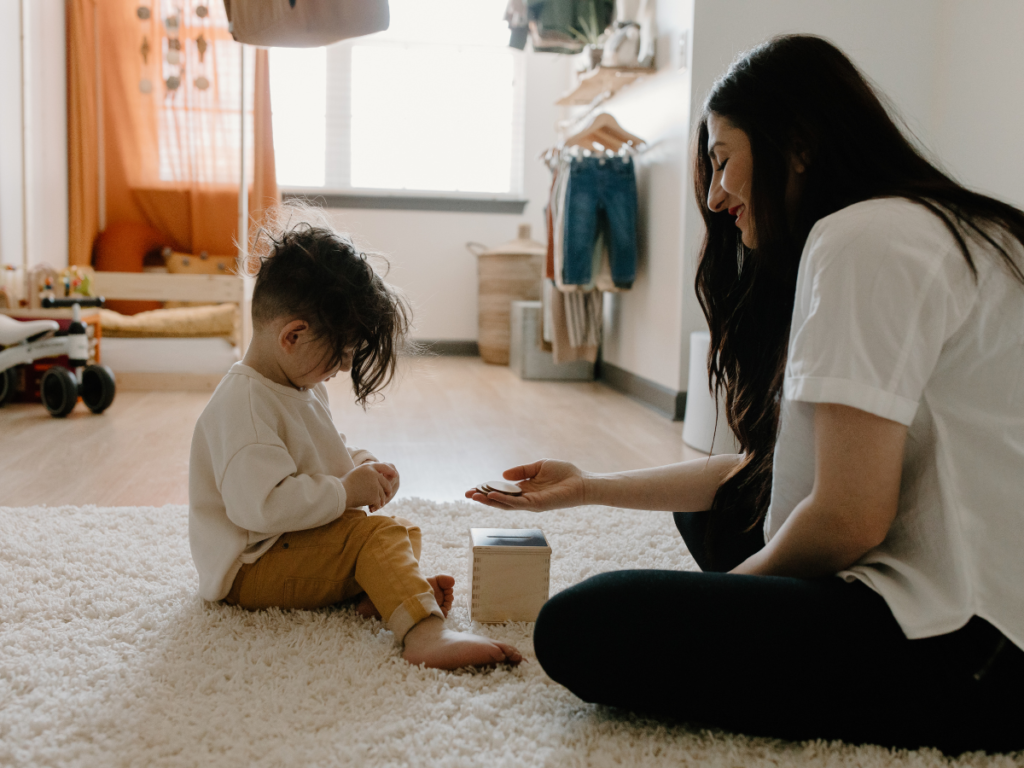
19. Parent Involvement:
Montessori preschools encourage parent involvement, which helps to build a strong partnership between parents and teachers. Montessori preschools believe that parent involvement is an essential component of a child’s education. When parents are involved in their child’s education, it helps to build a strong partnership between parents and teachers, which ultimately benefits the child’s learning and development.
In Montessori preschools, parents are encouraged to be actively involved in their child’s education. This involvement can take many forms, such as volunteering in the classroom, attending parent-teacher conferences, or participating in school events. By being involved, parents can gain a better understanding of their child’s learning style and needs, which can help to support their child’s learning at home.
Parents are essential to every child’s success
Furthermore, Montessori preschools recognize that parents are a child’s first teacher, and therefore, their involvement is crucial to their child’s success. Parents are encouraged to share their knowledge and experiences with teachers, which can help to create a more holistic understanding of the child’s development.
Montessori preschools also believe in open communication between parents and teachers. Regular communication between parents and teachers can help to ensure that both parties are working towards the same goals for the child’s education. It also allows for any concerns or issues to be addressed in a timely manner, which can help to prevent any problems from escalating. Overall, Montessori preschools encourage parent involvement as it helps to build a strong partnership between parents and teachers, ultimately benefiting the child’s learning and development. By involving parents in their child’s education and promoting open communication, Montessori preschools strive to create a collaborative learning environment that supports each child’s unique needs and abilities.
20. Preparedness for the Future:
Montessori preschools help prepare children for the future by fostering a love of learning and developing skills that are essential for success in life. The Montessori approach emphasizes the development of the whole child, including their social, emotional, cognitive, and physical development. One way that Montessori preschools prepare children for the future is by promoting independence and self-motivation. Children in Montessori classrooms are encouraged to take responsibility for their own learning, which helps to develop self-confidence and a sense of personal agency. This prepares them for the independence and self-motivation required in higher education and in the workforce.
Montessori preschools also place a strong emphasis on problem-solving and critical-thinking skills. Through the use of hands-on materials and activities, children are encouraged to explore, experiment, and discover solutions to problems on their own. This helps to develop a strong foundation for problem-solving, critical thinking, and creativity, which are essential skills for success in the future.
Learning perspectives and the bigger picture builds well rounded adults
Another way that Montessori preschools prepare children for the future is by fostering a sense of community and global awareness. Children in Montessori classrooms are exposed to a diverse range of cultures, traditions, and perspectives, which helps to develop an understanding and appreciation for diversity. This prepares them to be active and engaged citizens in a globalized world.
Finally, Montessori preschools emphasize the development of practical life skills. Children are taught to take care of themselves and their environment, which includes tasks such as cooking, cleaning, and gardening. This prepares them for the responsibilities of adulthood and encourages them to be self-sufficient. In summary, Montessori preschools prepare children for the future by fostering a love of learning, developing essential skills such as problem-solving and critical thinking, promoting community and global awareness, and teaching practical life skills. By providing children with a strong foundation for success in life, Montessori preschools aim to prepare them for a fulfilling and meaningful future.
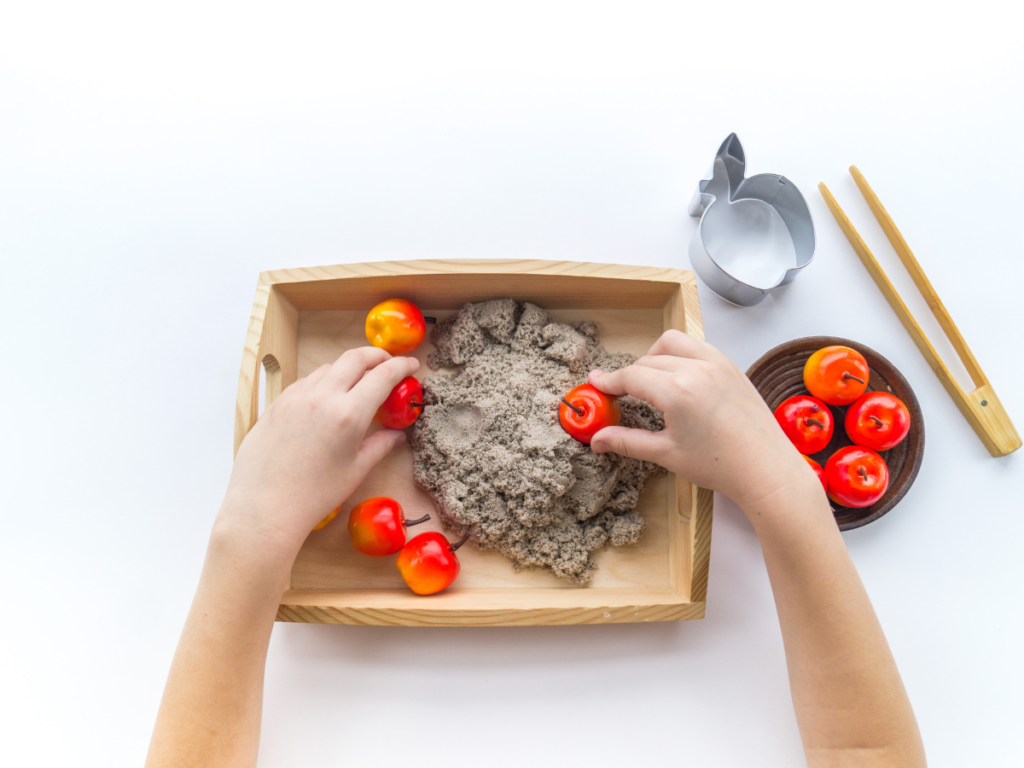
21. Adaptability:
Montessori preschools promote adaptability, as children are encouraged to explore and learn through their own experiences, they develop flexibility and adaptability to different situations, which is a valuable skill for success in all areas of life. Adaptability is a critical skill in today’s fast-paced and constantly changing world. Montessori preschools promote adaptability by creating an environment where children are encouraged to explore and learn through their own experiences. These materials and activities are designed to allow children to work at their own pace and to make their own choices, which helps to develop flexibility and adaptability to different situations.
Montessori preschools also emphasize the development of problem-solving skills. Children are encouraged to find solutions to problems on their own, which helps them to develop the ability to think critically and adapt to new situations. This promotes adaptability as children learn how to think creatively and come up with innovative solutions to different challenges.
Children thrive on constant challenge and change
Another way that Montessori preschools promote adaptability is by encouraging children to work in groups and collaborate with others. This helps them to develop social skills, including communication, cooperation, and conflict resolution, which are essential for success in all areas of life. By learning to work with others, children learn to adapt to different personalities, opinions, and ideas, which prepares them for success in a variety of situations.
Montessori preschools also promote adaptability by exposing children to a diverse range of cultural experiences and perspectives. This helps them to develop an understanding and appreciation for different cultures, which promotes adaptability and prepares them to interact with people from diverse backgrounds. In summary, Montessori preschools promote adaptability by creating an environment where children are encouraged to explore and learn through their own experiences, developing problem-solving skills, encouraging collaboration and communication, exposing children to diverse cultural experiences and perspectives, and promoting creativity and innovative thinking. These skills are essential for success in all areas of life, and Montessori preschools aim to prepare children to thrive in an ever-changing world.
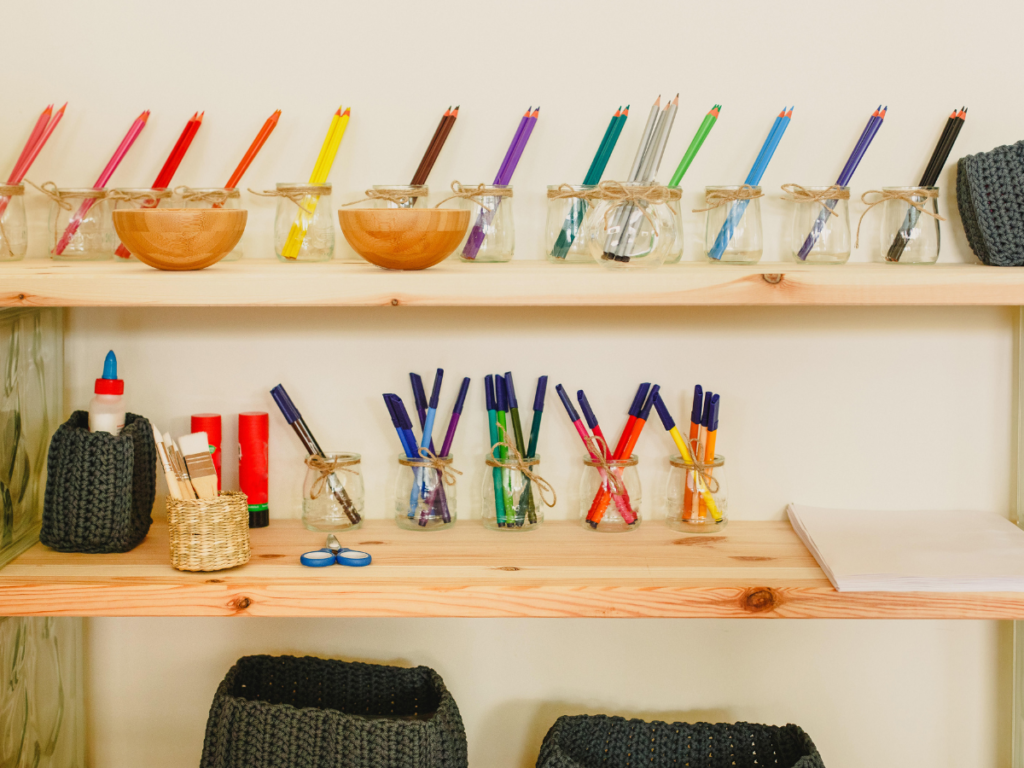
What are Montessori Toys?
Montessori toys are educational materials that are designed to support the Montessori philosophy of child-centered learning and development. These toys are carefully crafted to engage children in hands-on exploration and learning, promoting the development of a range of skills and abilities. Montessori toys are typically made from natural materials such as wood, metal, and fabric, and are designed to be simple, open-ended, and versatile. They encourage children to use their imagination and creativity to explore, experiment and discover new concepts and ideas.
“Montessori toys are often designed to be used in a specific way, with each toy promoting the development of a particular skill or ability.”
For example, the iconic Montessori pink tower is designed to help children develop their visual perception and fine motor skills, while the knobbed cylinders help children develop their spatial awareness and hand-eye coordination. Montessori toys also emphasize the importance of self-directed learning, allowing children to work at their own pace and to explore their interests and curiosities. This approach helps to promote a love of learning and encourages children to take an active role in their own education.
In summary, Montessori toys are educational materials that are carefully crafted to engage children in hands-on exploration and learning, promote the development of a range of skills and abilities, and encourage self-directed learning. They are made from natural materials, are designed to be simple and versatile, and are an essential part of the Montessori educational approach.
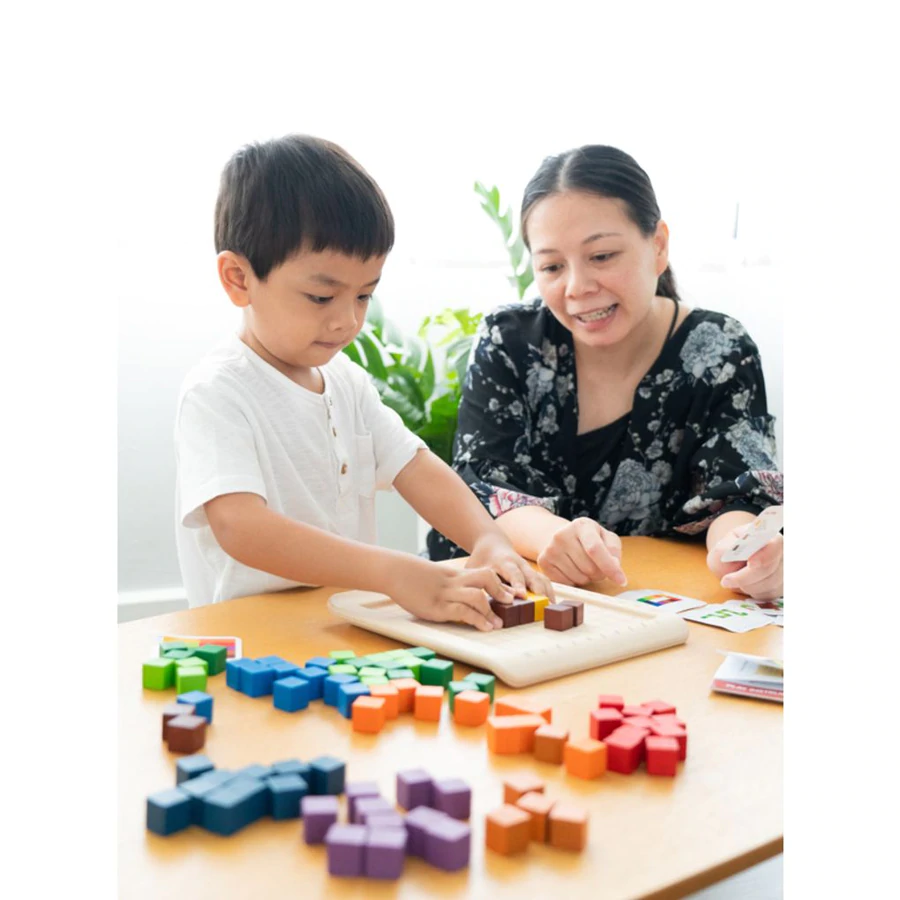
What are the 10 Categories of Montessori Toys?
Sensorial toys:
These are toys that help children develop their senses, such as toys that allow them to explore different textures, colors, and shapes.
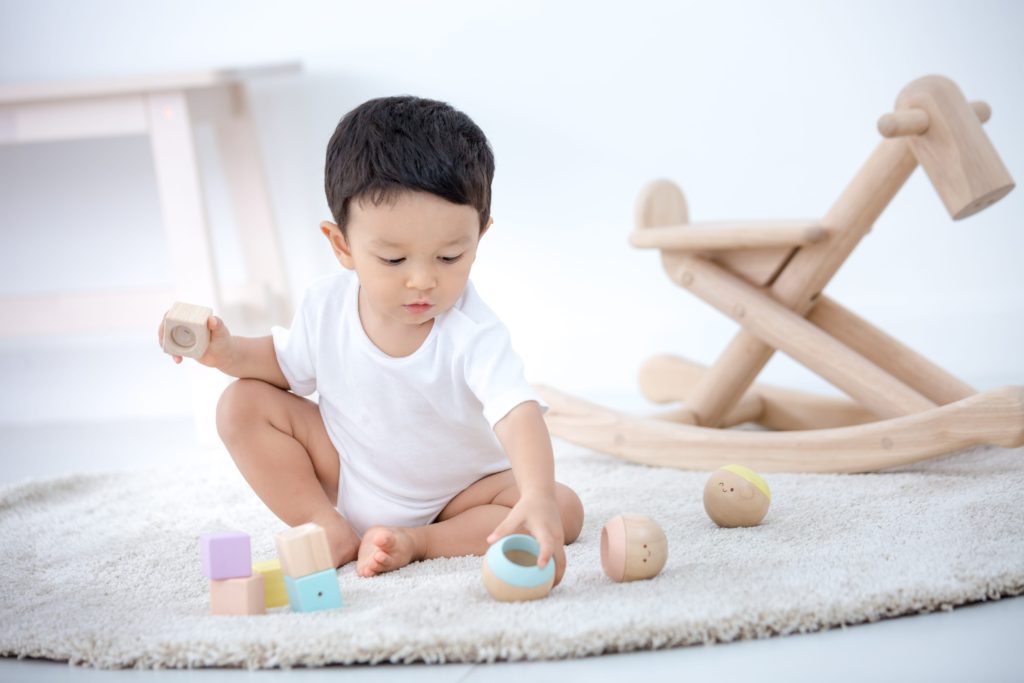
Language toys:
These are toys that help children develop their language skills, such as puzzles with letters and words, and books with simple words and pictures.
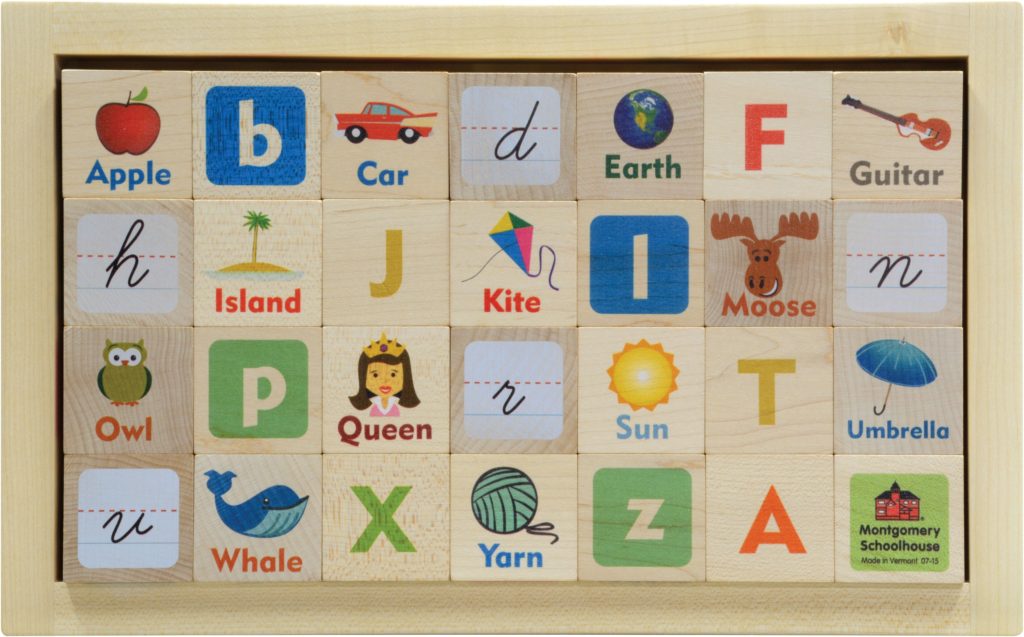
These feature one letter per block with upper case, lower case, cursive, and three related pictures.
Math toys:
These are toys that help children develop their math skills, such as counting blocks, sorting toys, and puzzles with numbers and shapes.
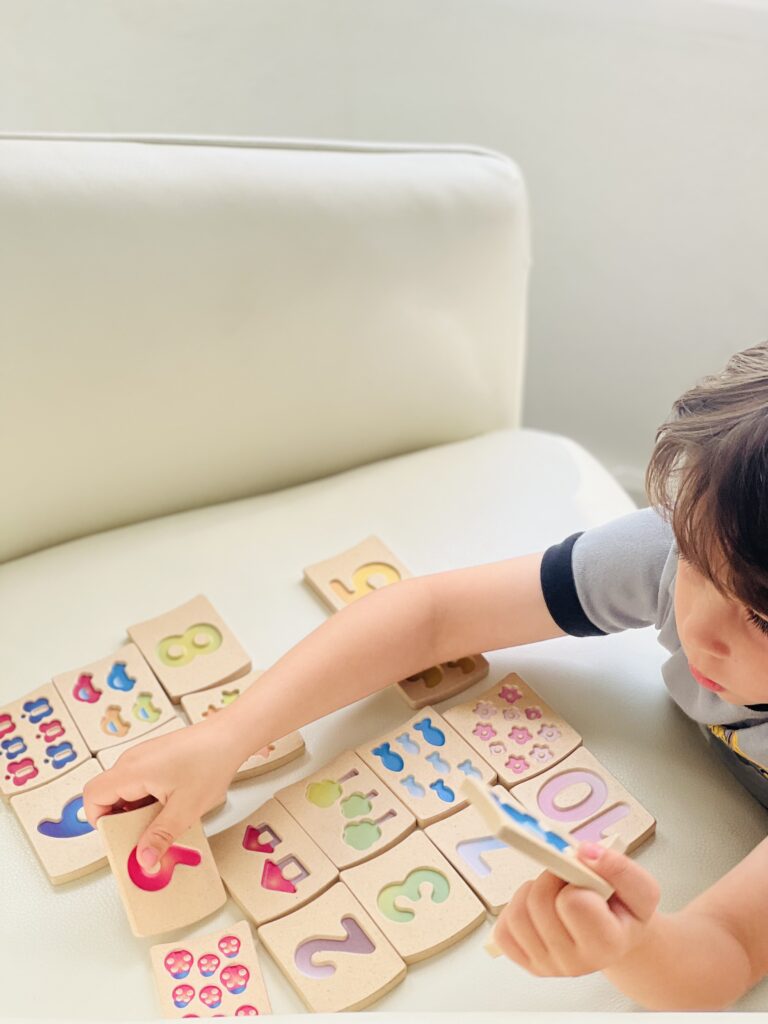
Practical life toys:
These are toys that help children develop skills needed for everyday life, such as cooking sets, cleaning tools, and sewing sets.
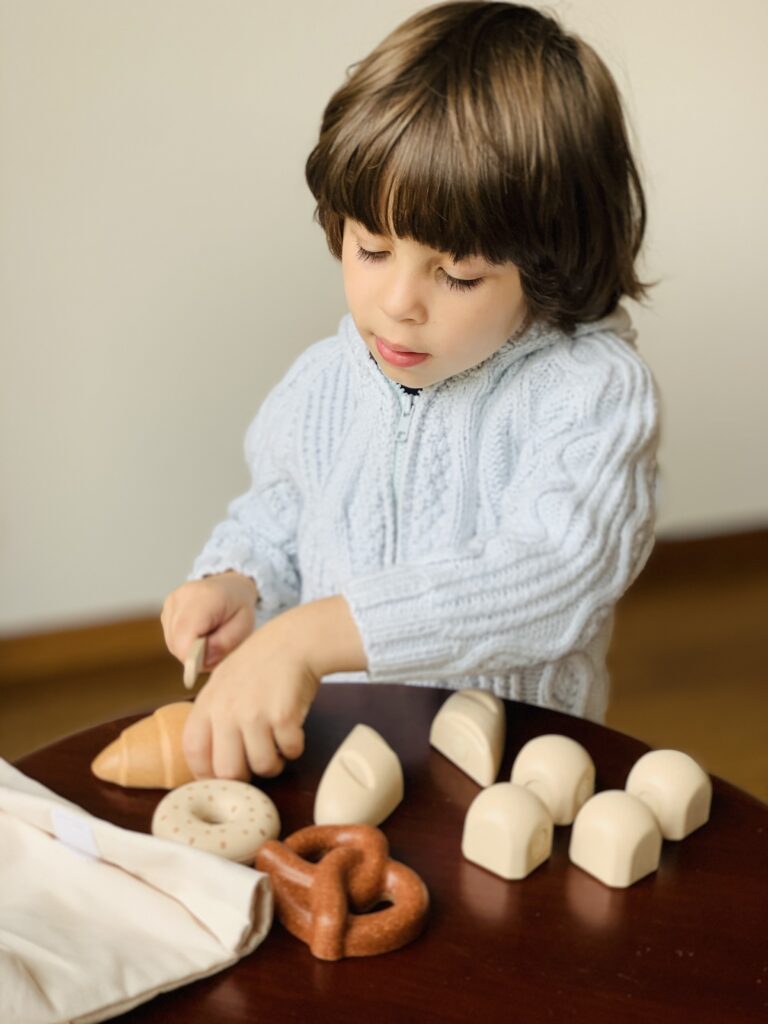
Science and nature toys:
These are toys that allow children to explore and learn about the natural world, such as magnifying glasses, bug catchers, and plant-growing kits.
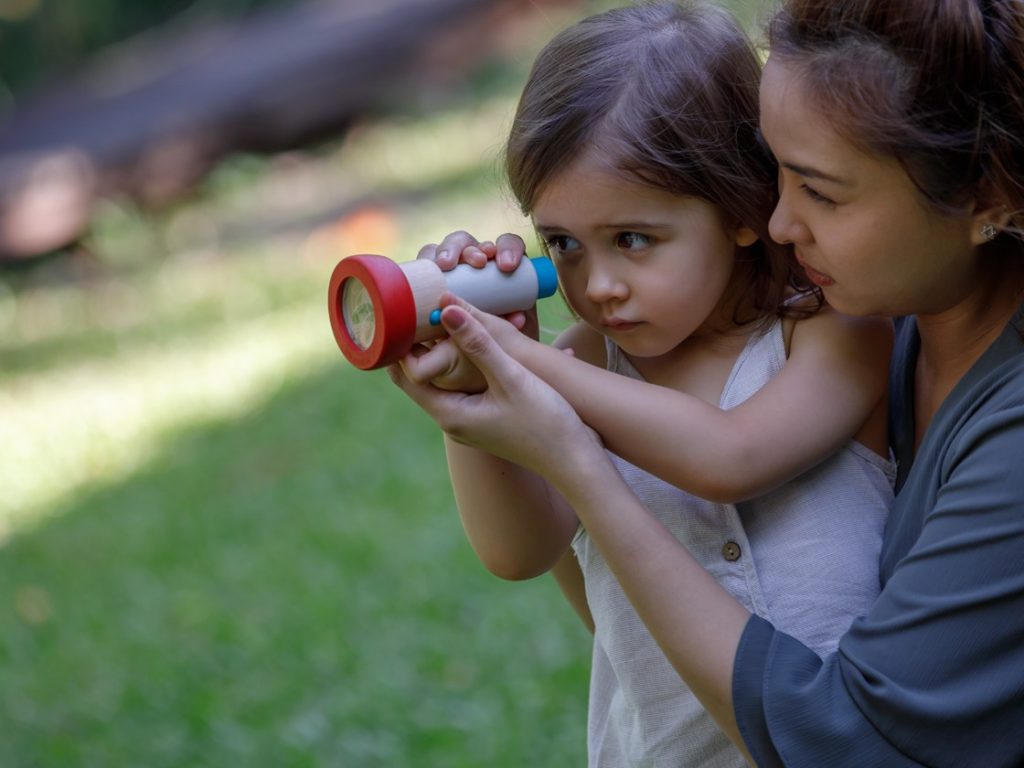
Art toys:
These are toys that allow children to express themselves through art, such as drawing and painting sets, play dough, and crafting materials.
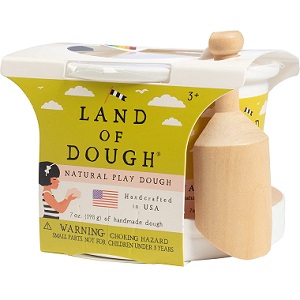
Music toys:
These are toys that allow children to explore and learn about music, such as rhythm instruments, xylophones, and music-making sets.
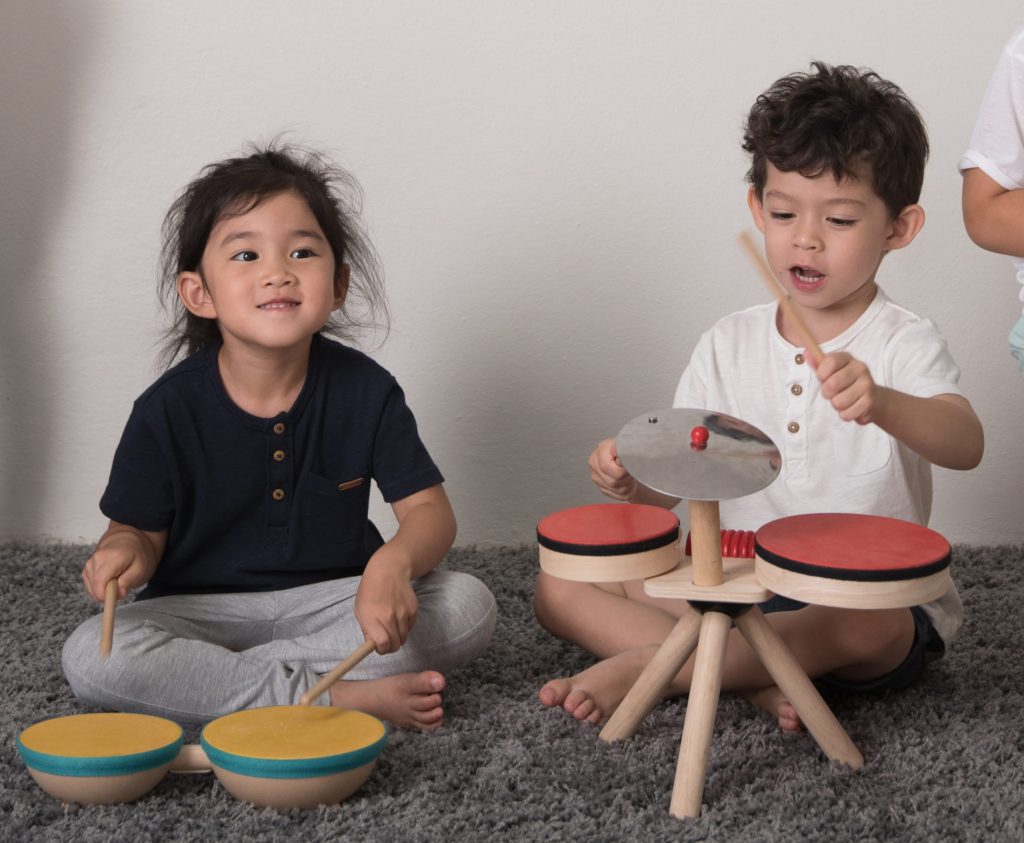
Construction toys:
These are toys that allow children to build and create, such as building blocks, puzzles, and construction sets.
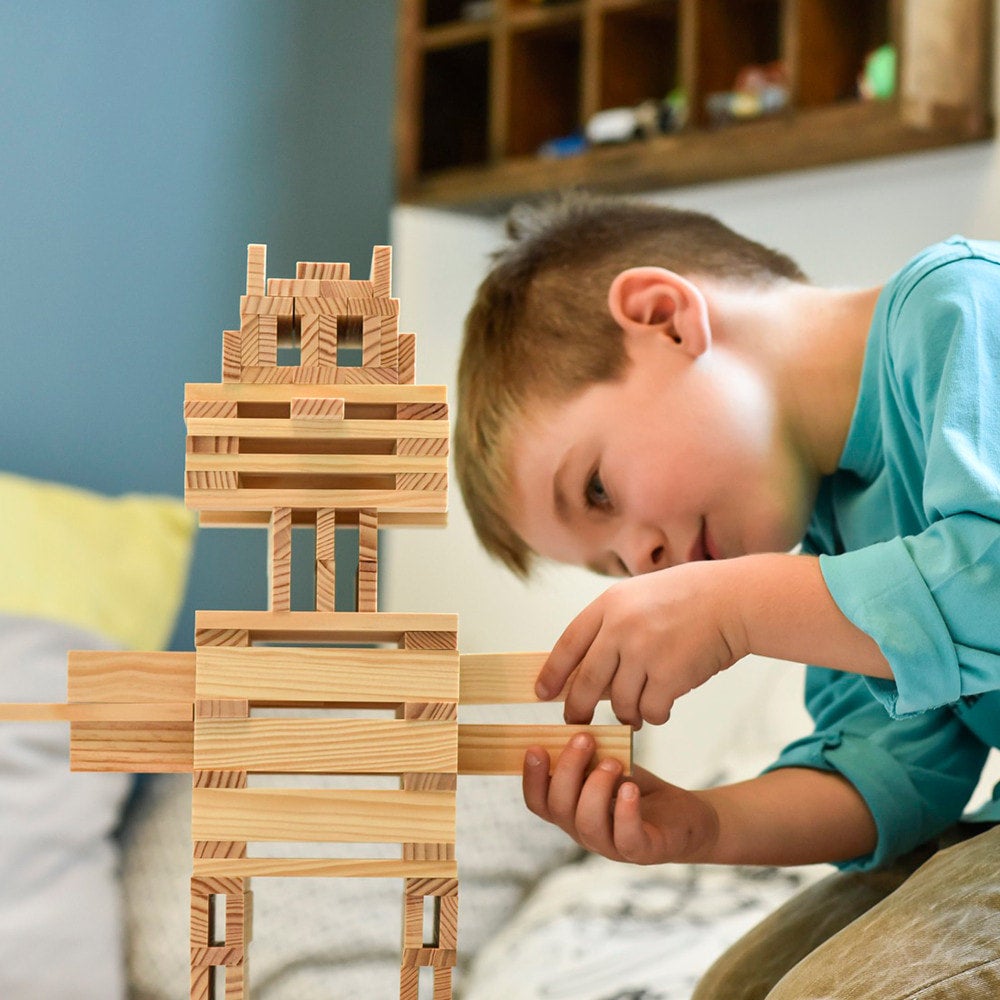
Movement toys:
These are toys that encourage physical activity and movement, such as balls, balance boards, and jump ropes.
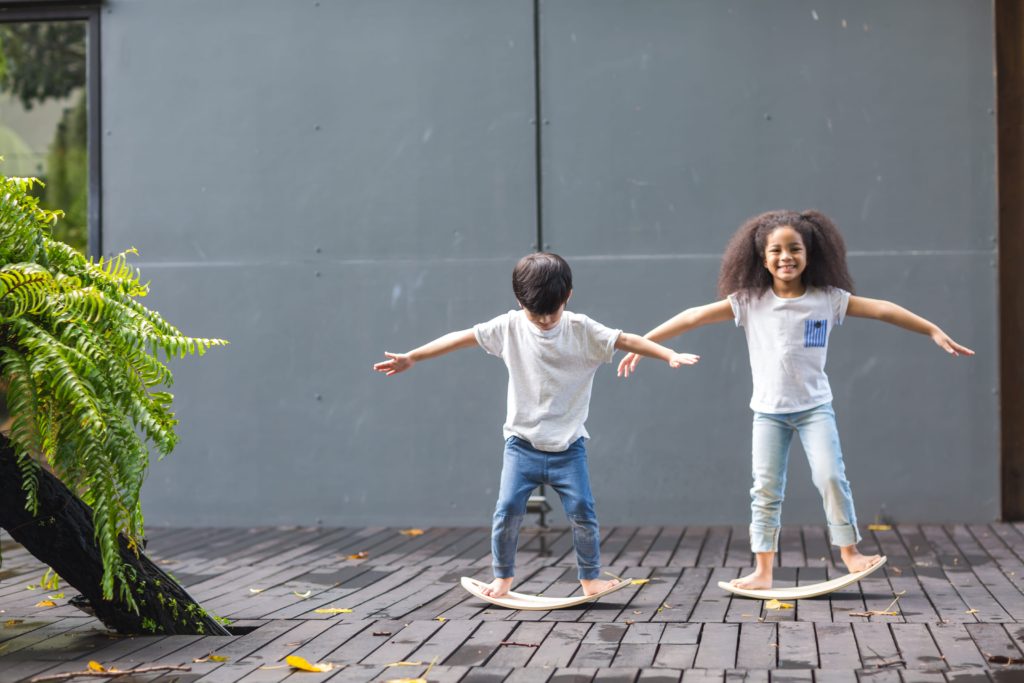
Social toys:
These are toys that encourage social interaction and cooperation, such as board games, puppets, and role-playing sets.
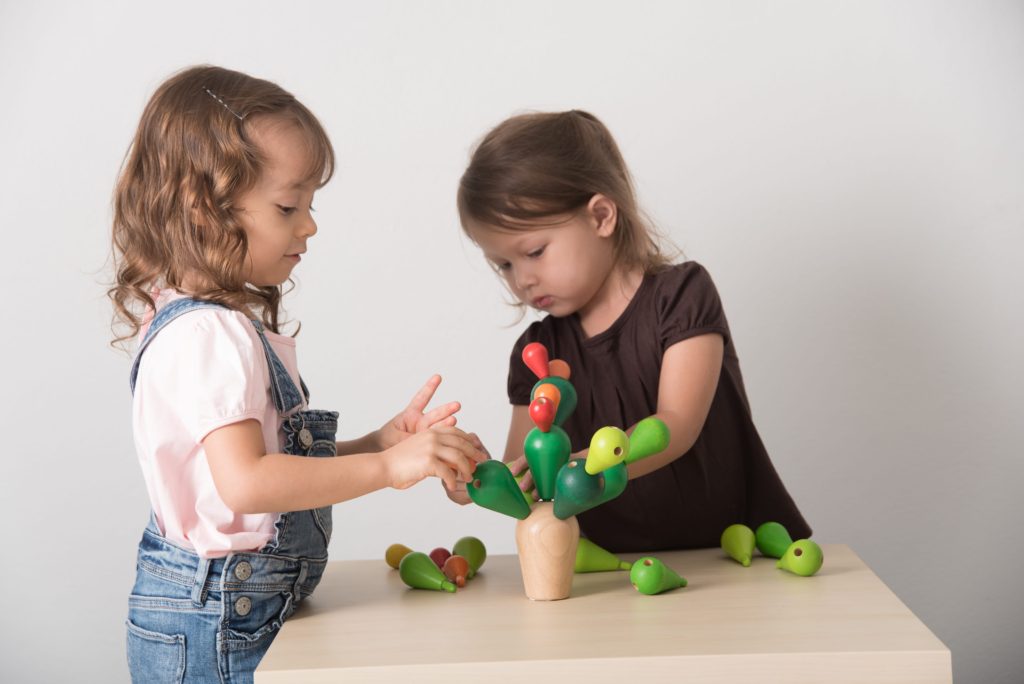
Summary:
Montessori education is an educational approach developed by Dr. Maria Montessori in the early 20th century that emphasizes a child-centered learning environment that fosters independence, freedom within limits, and respect for a child’s natural development. In a Montessori classroom, children work independently and at their own pace, choosing from a range of hands-on materials designed to develop their skills and understanding of concepts.
The Montessori approach emphasizes the importance of the whole child, including their cognitive, social, emotional, and physical development.
Montessori classrooms are typically mixed-age, allowing children to learn from each other and develop a sense of community and responsibility.
Teachers in Montessori classrooms are trained to observe and guide children’s development, rather than directing their learning or providing answers. Montessori education has been shown to have a positive impact on children’s academic and social outcomes, as well as their self-esteem and love of learning. While Montessori education has become increasingly popular over the years, it remains a niche approach to education that is not widely adopted in traditional schools.
Overall, the Montessori approach values children’s innate curiosity and desire to learn and provides a nurturing environment that encourages their growth and development as independent, responsible, and compassionate individuals. Montessori preschool is a unique approach to early childhood education that emphasizes self-directed learning, hands-on experiences, and individualized attention. With a focus on developing the whole child, Montessori preschools promote social skills, creativity, critical thinking, and emotional intelligence.
By providing a nurturing environment that encourages independence, respect, and responsibility, Montessori preschools help children to become confident, adaptable, and lifelong learners. If you’re looking for an educational approach that prioritizes your child’s holistic development and fosters a love of learning, Montessori preschool may be the perfect choice for your family. If you enjoyed this article, please become a part of my sustainable parent team and subscribe!


